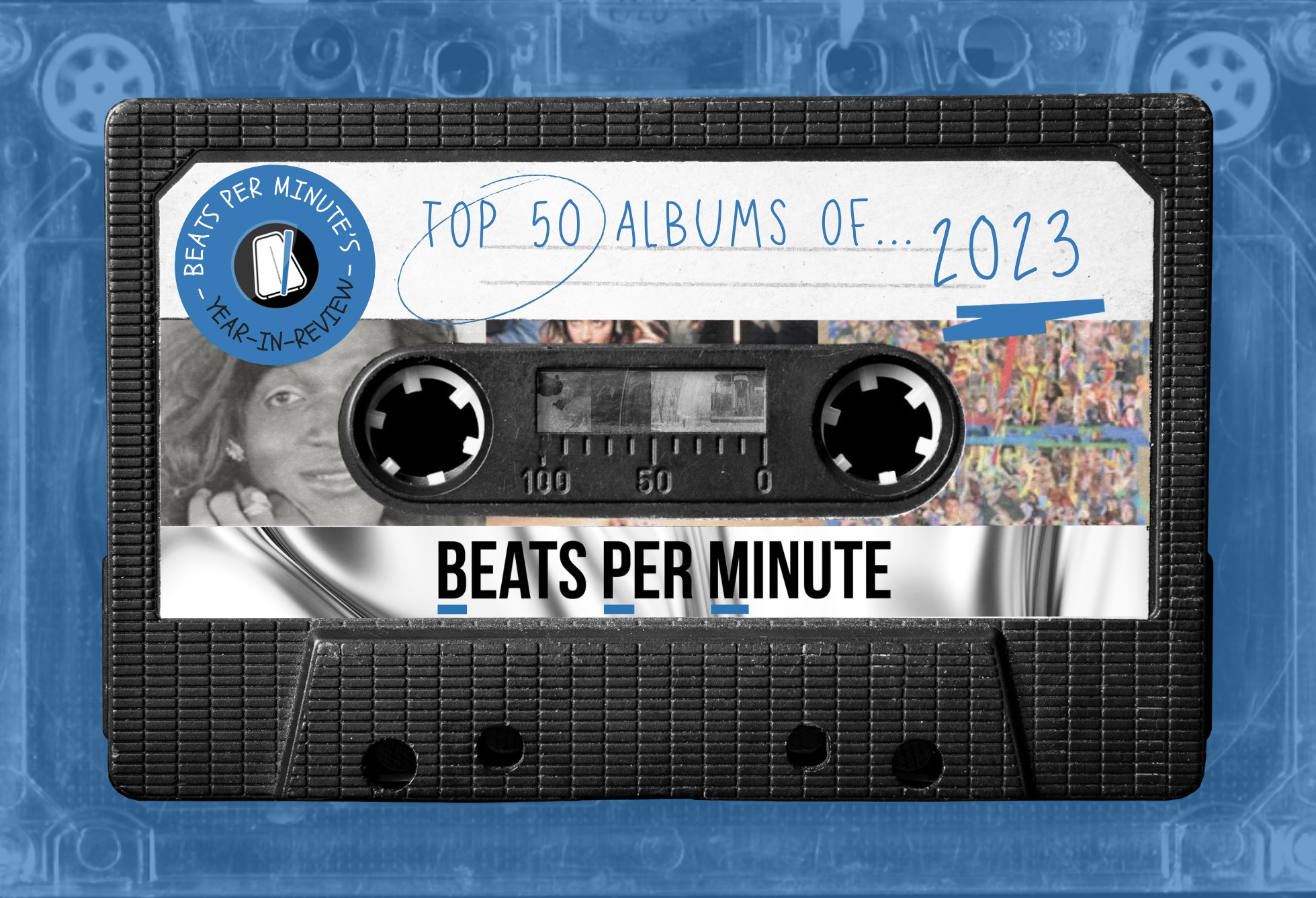If you are reading this: CONGRATULATIONS, you have survived war criminal Henry Kissinger and made it to the end of 2023! And we are glad you did, really. Because at this point, even mentioning the utter chaos engulfing the global sphere seems like a retread of the past years in this dastardly decade. In times of great upheaval, it’s all the more important to find some sense of stability, and the BPM staff are content to tell you that, no matter how rough this ride or cold the night, we are here for you, with our very own brands of humour, pedantry and poetry, so we can wither this storm together, with all the great music that soundtracks these days.
And great music we had indeed! Shoegaze is back, and here to stay definitively, with old heroes returning and innovators on the horizon! From Liv.e to Kelela and Amaarae to Pink Pantheress, modern R’n’B is shaping into one of the most unbound current day genres, debating the private within frameworks of the political and transcending all genre boundaries. Abstract hip-hop is finally garnering into mainstream appraisal, as the far-reaching discourse surrounding albums by JPEGMAFIA, Armand Hammer, Danny Brown and NoName showed. Political post-punk found a new, strong voice in the sub-genre of Futurismus, all while singer-songwriters shared their most intimate anxieties, reflecting on a three-year-cycle that felt like a waking dream – one where Billy Corgan released a 33-track Synth-Rock-Opera about cancel culture and Charles Bissell of The Wrens finally released new music!
In fact, 2023 seemed so packed to the hilt with amazing records that we found ourselves unable to include or mention them all – and thus, after long afternoons debating over red wine and hot chocolate, the staff has finished our Top 50 Albums of the Year, reflecting all of our unique tastes, a shining beacon within the midnights of this year, and hopefully one which will allow you to find appreciation for the familiar and unfamiliar music the year had to offer.
But that’s not all: in the coming days, the staff will also release our Honourable Mentions, as well as personal essays, individual charts and playlists to provide you with even more to dig through and experience. So before we bid you a nice day: thank you for being with us and giving us your time. If it’s cold outside, we hope you soon will be warm. Should you hear blasts in the near distance, we are thinking of you. And if you need to chat, never feel bad to reach out. We are here for you!
Thank you! And here are our 50 records of 2023.
Listen to a Spotify playlist of our highlights from our Top 50 Albums of 2023 here.
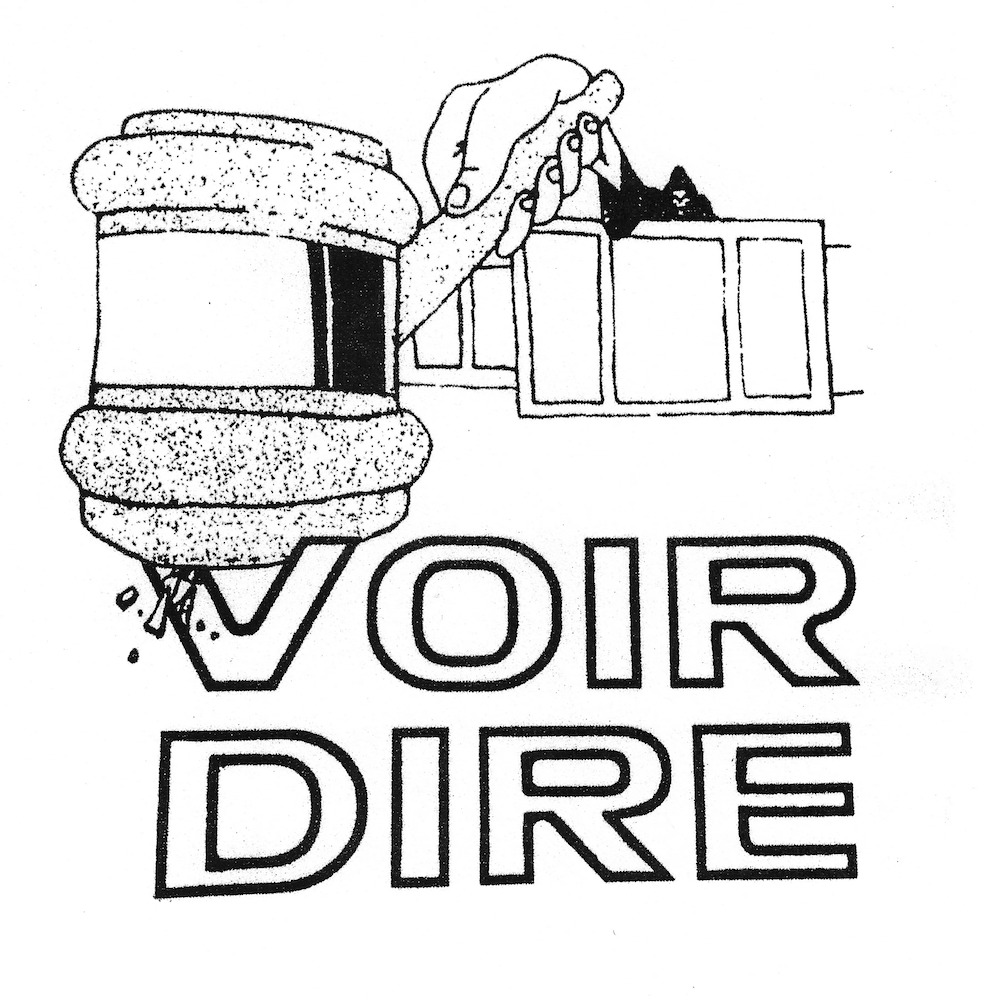
50.
Earl Sweatshirt & The Alchemist – Voir Dire
[Tan Cressida/Warner]
That purists would flock to this album at an hour when they feel trapped overlooks the evidence that Voir Dire is only nominally hip-hop. Earl Sweatshirt doesn’t rap or rhyme so much as read his own thoughts. Where MCs of old helped with transitions and kept the party going, The Alchemist instead has the job of reacting to the man on the mic who has slumped off stage and onto a couch in the green room. Voir Dire naturally appeals to Sweatshirt addicts and Genius annotees who dutifully chronicle his wordplay and paste the best bits into their Insta bios, but the revelation lies in how The Alchemist responds with shades (almost uniformly light to counter the darkness) and spliced or non-existent rhythms. Its freeform appearance conceals an expertly manicured structure that only reveals itself when it ends. – Steve Forstneger
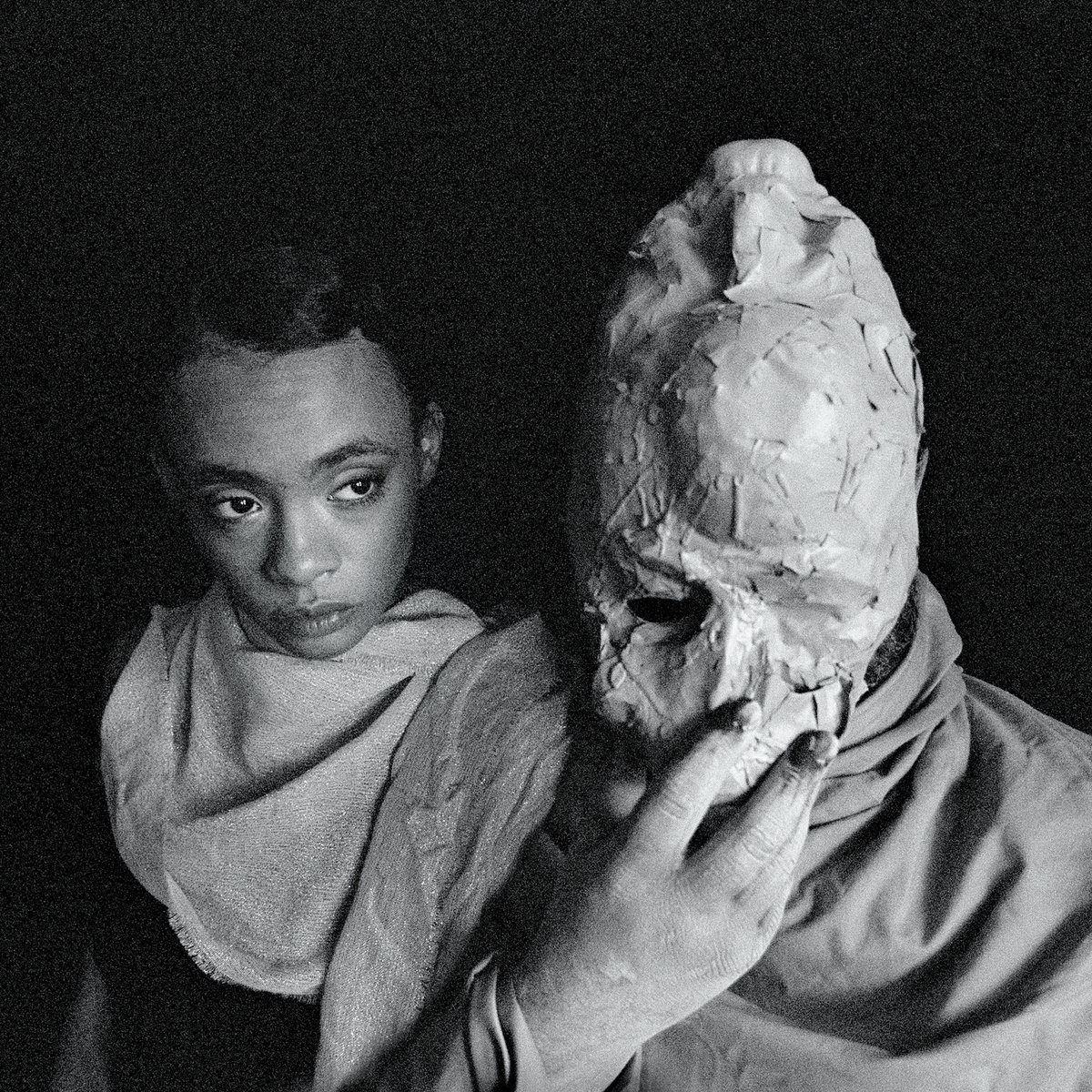
49.
Protomartyr – Formal Growth in the Desert
[Domino]
There’s a hilariously awkward interview that Protomartyr gave earlier this year on CBS Detroit because they were holding a listening party at an upcoming Detroit Tigers game (that’s baseball, UK readers). The anchor has clearly never heard a note of Protomartyr’s music, has an idea in his mind about what success in the music industry looks like, and asks “when you’re at this point in your career, how much are you still waiting on that opportunity to hit it big?” Guitarist, Greg Ahee almost guffaws as he responds, “I think we gave up on that!”
Clearly, the members of Protomartyr understand that their idiosyncratic brand of melancholic post-punk is never going to top the Billboard charts or go viral on TikTok, nor would they ever compromise their vision and sound to chase those goals. What we can be thankful for, and what the band expresses their gratitude for (despite being in their own words “poor” [insert passionate rant about the fucked up nature of the music industry economy and the way it grinds independent artists into meal]), is that Protomartyr have maintained a level of success that has seen them survive into their 13th year and sixth album.
Formal Growth in the Desert might even rank amongst their best work, as it lets in more light than ever before, greater sonic variation via the influence of cinematic scores and creative production choices, whilst operating at a more complex emotional level than on their prior work. It’s an album deeply scarred by the experience of the COVID pandemic; it’s about adversity and comebacks, about the hold of the past, the confusion of the present, and the uncertainty of the future.
Frontman and lyricist, Joe Casey, has long been one of rock’s foremost lyricists, often dealing in obtuse references and sardonic asides, but on their latest record he allows himself to be bluntly vulnerable. A key line is repeated like a mantra on “Polacrilex Kid”: “Can you hate yourself and still deserve love?” Consistency and reliability can lead to being taken for granted, and Protomartyr haven’t put a foot wrong their whole discography. I implore you, don’t take Protomartyr for granted, they deserve your love. – Andy Johnston

48.
Anna B Savage – in|FLUX
[City Slang]
Your 20s are some of the most unstable and uncertain times in your life, something that Anna B Savage knows well and chronicled beautifully on her debut album A Common Turn. That excavation continues into her immaculate second album in|FLUX, where her rendering if the emotional fluctuations that come with being an empathetic, burgeoning artist and serial lover are rendered in more spellbinding detail.
The folk basis has not been left behind, but with the aid of Mike Lindsay (Tunng, LUMP) she has subtly slipped in a new layer of atmosphere. This comes through in the stuttering beats underscoring her uneasiness in “The Ghost”, the whispering brass chiming with her longing in “I Can Hear The Birds Now” and the spacey electronics of the title track.
Of course, sexual explicitness is still here, most notably on “Pavlov’s Dog” where it’s less direct but more carnal than her previous efforts. “Touch Me” is similarly vivid, but again shows both greater maturity and boldness in her request for rough play and her admission that “I enjoy aching for more”.
Elsewhere, there is a potent quietness to Savage’s musings. Her admissions of “you’re in my dreams an awful lot” on “Crown Shyness” are illuminated with sparkling brass and keys, while “Say My Name” finds her almost fading into her insecurities as a wellspring of turbulent instrumentation threatens to swallow her.
Overall, in|FLUX is a deeply affecting portrait of what its like to be in that in-between state of early adulthood, which often extends into true adulthood – and, perhaps, is always there. At least we have this album to accompany us through that unknown path. As she signs off on “The Orange”, “If this is all that there is / I think I’m gonna be fine.” Listening to this album helps us reach the same acceptance. – Rob Hakimian
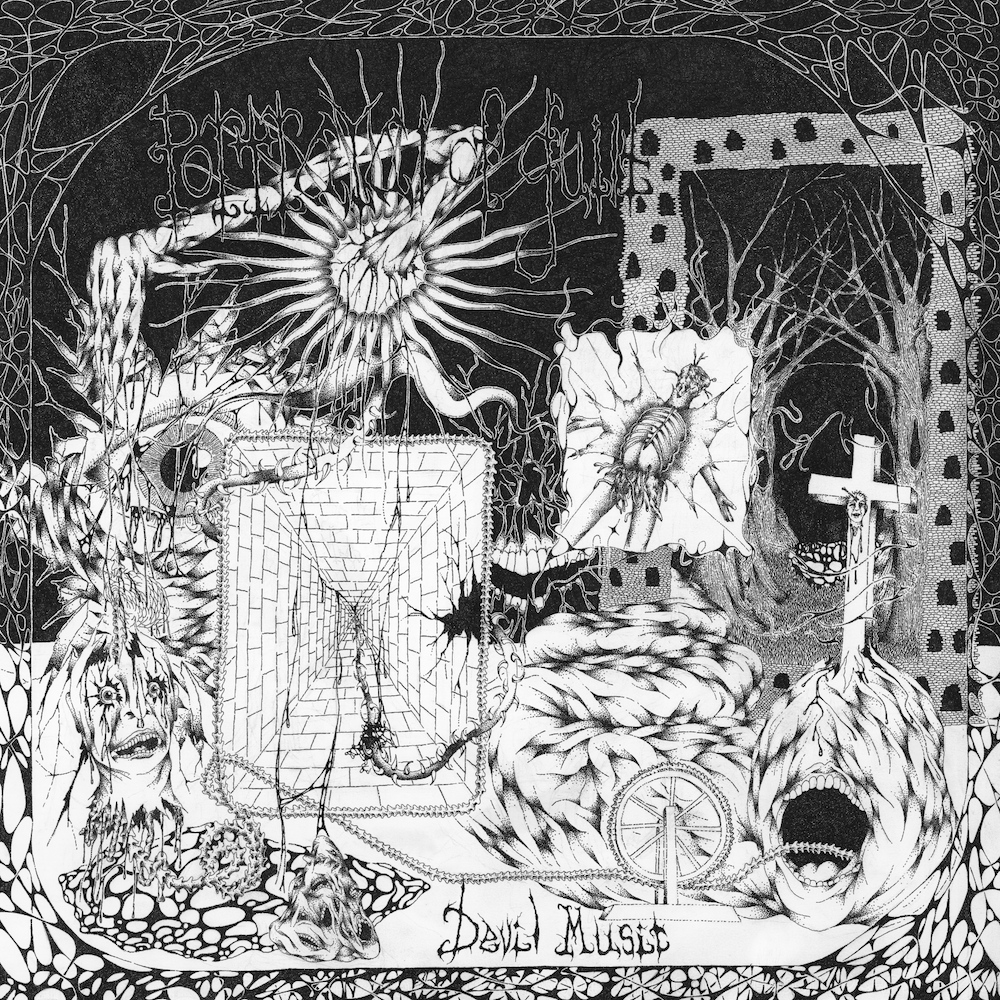
47.
Portrayal of Guilt – Devil Music
[Run For Cover]
Devil Music is beautifully rotten to its core. The usual black metal lyrical elements of corpses, lingering pain, and decayed breath are all present and correct. There’s a ferocity to the musicianship that sees Portrayal of Guilt push even further beyond the challenging sonic parameters that 2021’s Christfucker heralded for the band.
It’s an album of two parts. The first is an exquisite maelstrom of vitriolic black metal savagery, while the second is the same songs reinterpreted for orchestral strings. And it works. The latter versions showcase the more nuanced elements of the songs that all too often get lost in the aural cacophony that Portrayal of Guilt conjure up. Matt King’s vocal cord shredding lyrical delivery in the second half feels even more violent as it’s more exposed, more squalid and more rapacious. When he hollers “{I wanna watch you suffer}” on “V (Devil Music)” it feels like the unhinged denouement to a folk horror film where nobody gets out alive. Lovely stuff.
What do they put in the water down in Austin, Texas? – Todd Dedman
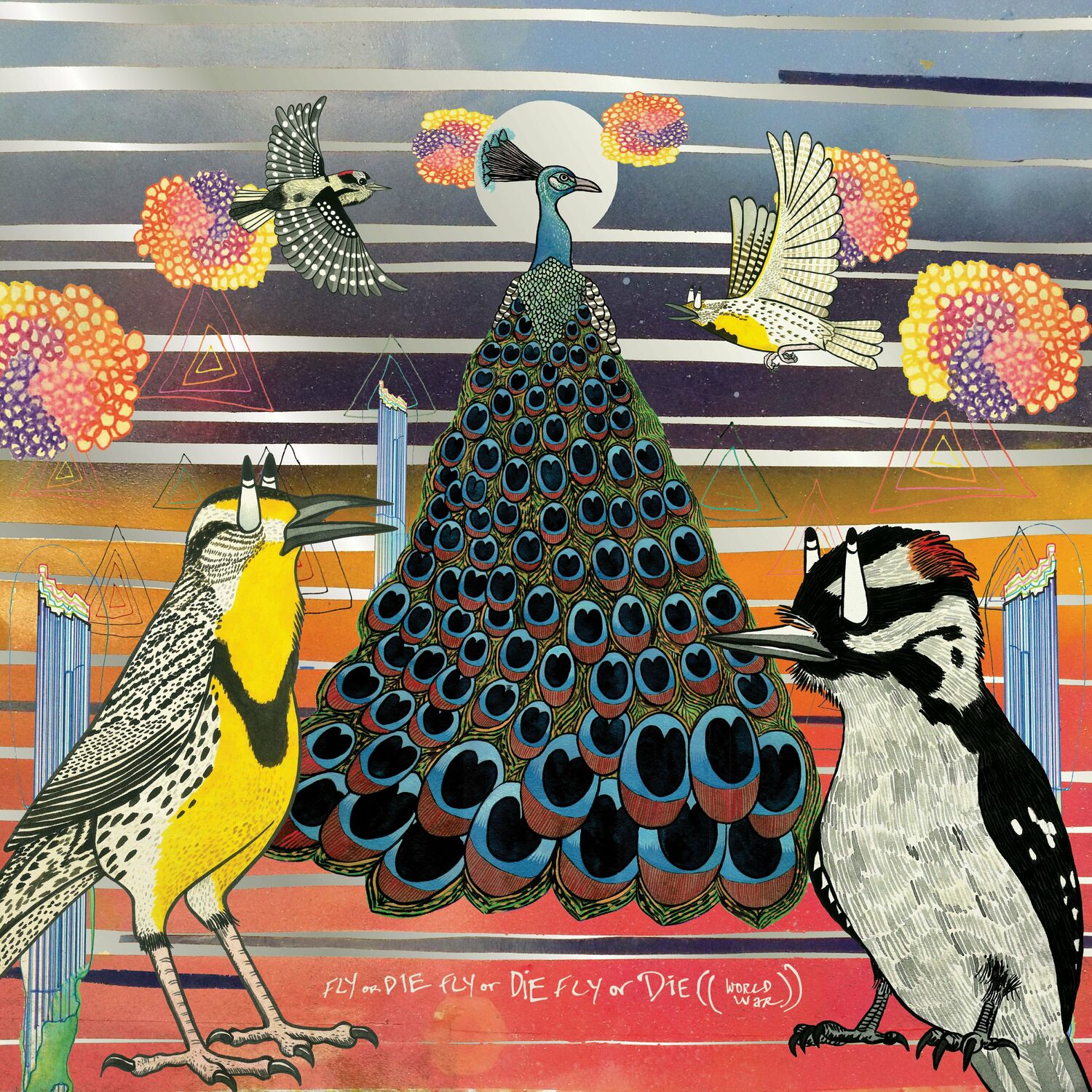
46.
Jaimie Branch – Fly or Die Fly or Die Fly or Die ((world war))
[International Anthem]
On “Burning Grey”, the epic nine-minute centerpiece of Jaimie Branch’s posthumous album Fly or Die Fly or Die Fly or Die ((world war)), drums and Branch’s own trumpet crescendo into ever-more mesmerizing forms as she confronts a world where “everything feels broken”. The lengthiest and most powerful number from her new LP effectively finds the late trumpeter passing on the baton of creative excellence from herself to listeners (“believe me, the future lives inside you”).
Fly or Die Fly is a wonderfully expansive and entirely untamed masterpiece – moving effortlessly from the epic “Burning Grey”, the reworking of a Meat Puppets song with “The Mountain”, and the Caribbean-infused “Baba Louie”. In short, it’s one hell of a note to go out on. But it’s a bittersweet one too, and not just because of the evident joy Branch got from creating music. Whereas Fly or Die Fly towers above many artists’ very best work, one senses that Branch was only just getting started. – Tom Williams

45.
Black Belt Eagle Scout – The Land, The Water, The Sky
[Saddle Creek]
Following 2019’s At the Party with My Brown Friends, it was not exactly a short wait for Katherine Paul’s next statement. Thankfully, her latest LP as Black Belt Eagle Scout was exactly that: an acute, carefully considered moment. Each step she takes feels deliberate and wisely measured. Where At the Party mined personal experience with something of a wry wink, never losing the humor amidst the pain, The Land The Water The Sky reaches for something more universal within the Native American experience, with each moment feeling nearly severe in its weight and intent. It’s an album that almost seems to prickle the touch, wary, weary, and loving, all at once. With delicate instrumentation that feels as if it echoes with the terrain it’s meant to capture, music that occurs across wide, open spaces. I’m not a particularly spiritual person, yet I can’t help but feel the spirit within the music found here. – Chase McMullen
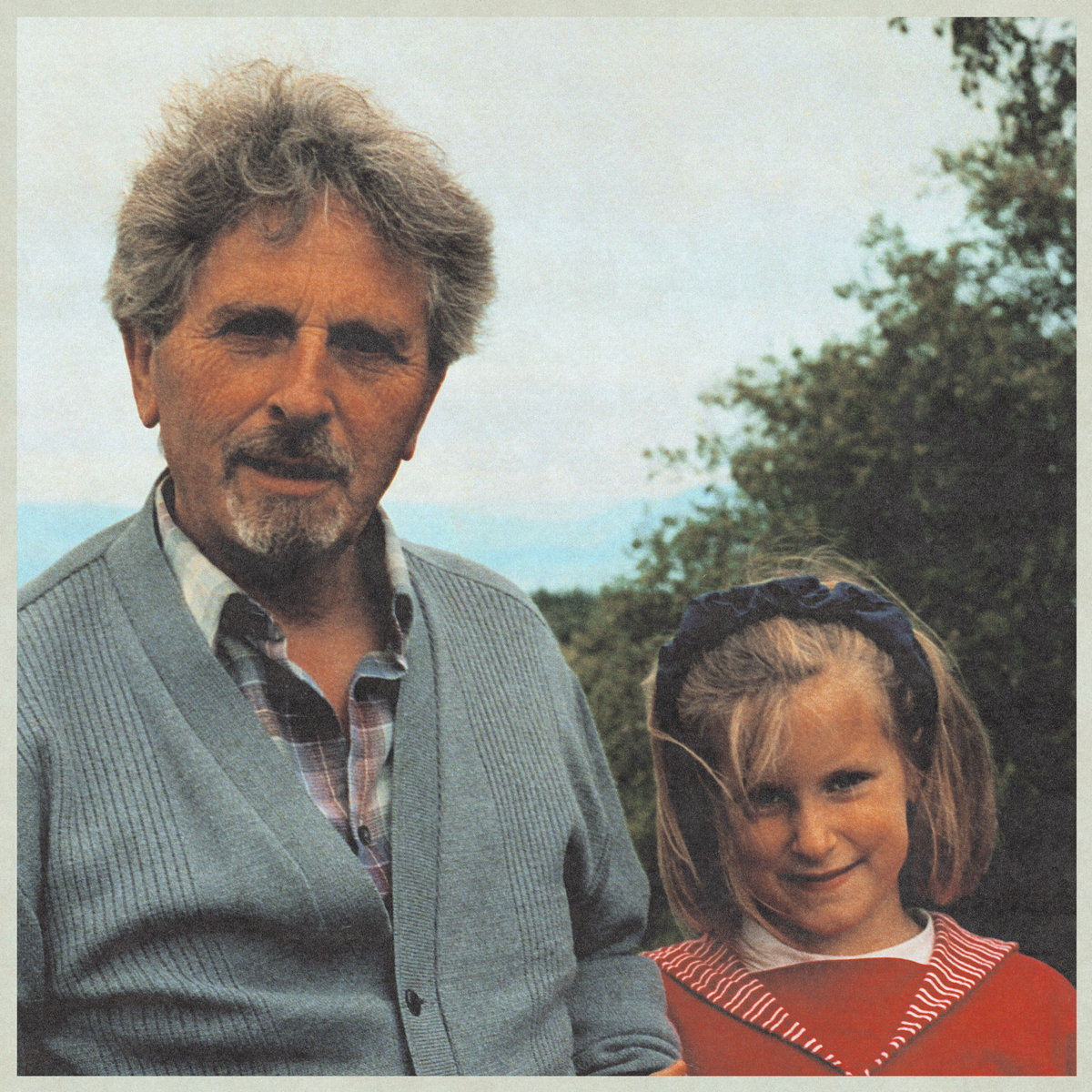
44.
Susanne Sundfør – blómi
[Bella Union]
Norwegian singer-songwriter Susanne Sundfør doesn’t make music that you can luxuriate in; it’s confounding, beautiful, decays ever so slightly, and slinks up your spine without the slightest hesitation. Her latest release is dedicated to her family, to the threads of communication, to the way language binds us. But blómi is more akin to a sound installation than an album – an erratic and experimental pop and folk miasma that revels in the way sound can be manipulated and distorted in search of foundational understanding and inter-emotional revelation.
The album is bookended through the baroque jazziness of spoken word opener “Orð Vǫlu” and the warped electronics of closing track “Orð Hjartans”, but it’s in the core of the album that Sundfør discovers the truth about our hearts, about the multidisciplinary affections that connect us to those who’ve come before and to those not yet afflicted with our attention.Tracks like “Fare Thee Well” and “Leikara Ljóð” are doused in an amalgam of traditional and mutated musical histories, giving her room to explore all aspects of her influences.
But it’s “Alyosha”, the crowning achievement of blómi, that gives full recognition of her abilities to untangle rhythmic antecedents, to marry the pure pop euphoria of ABBA with a more modern perspective on pop distillates. And this miraculous attunement speaks to Sundfør’s awareness of the underlying emotional relevance of these sounds and these lineages. In the end, it doesn’t matter what we bring with us, it’s how we realize that inborn potential, and this album gives us support to explore all the angles of our world, of our life, of the love we share with the people around us. – Joshua Pickard
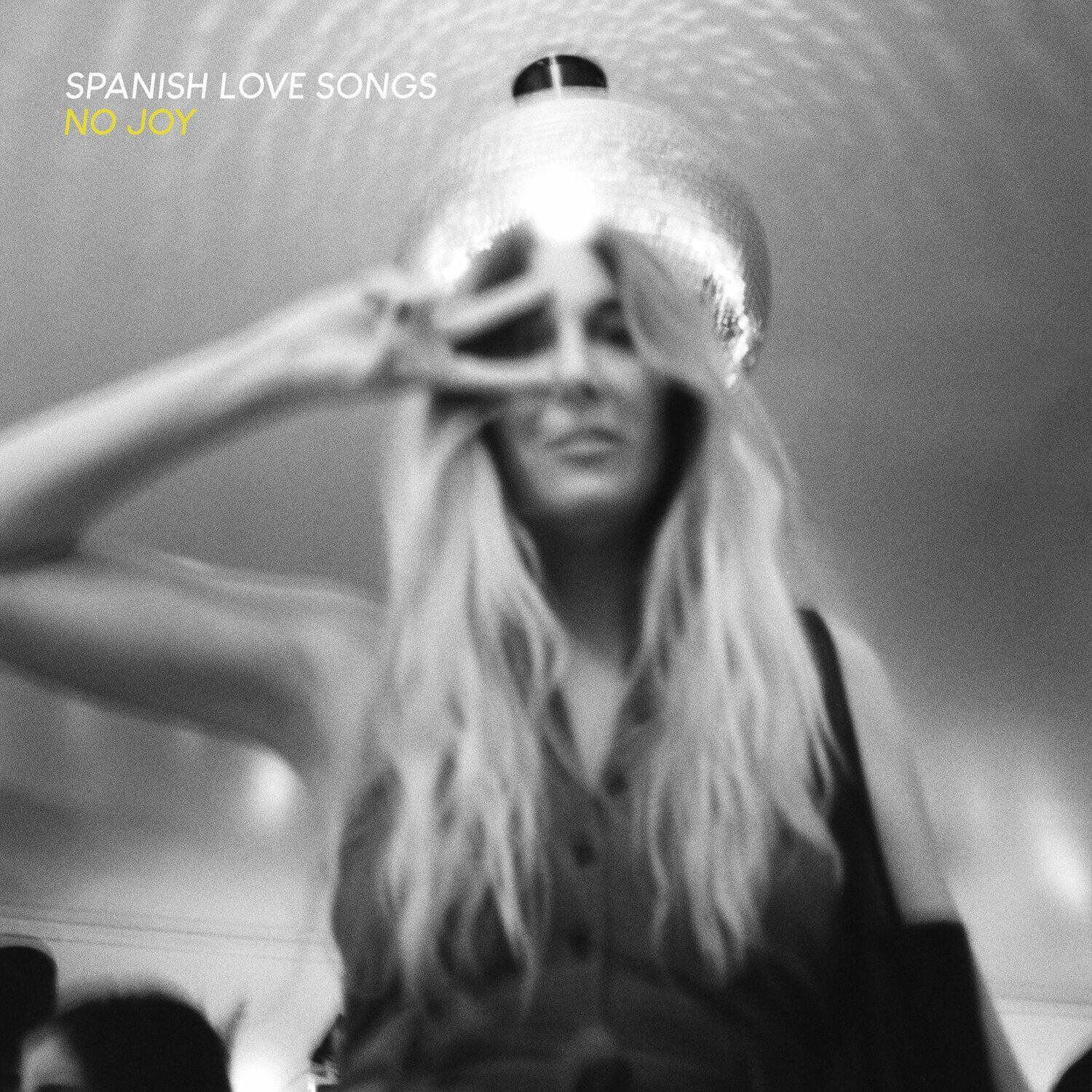
43.
Spanish Love Songs – No Joy
[Pure Noise]
With their latest album, No Joy, Spanish Love Songs offer their most focused, adrenalized, and adeptly crafted sequence. Opener “Lifers” spotlights Dylan Slocum’s evocative vocal and the band’s punk-and-heartland-rock-informed rhythms and accents. “The baby fat that’s hiding in your cheeks won’t fade”, the song offers, depicting a self-destructive person who can’t shed their childhood traumas. Bright/pop-punk drums and a wiry bass, meanwhile, undergird “Clean-Up Crew”. “Fuck the garden and the yard / I can barely tend to my own dreams”, Slocum laments, displaying his knack for a transportive hook while reporting on a relationship burdened by worldly pressures and unrealized dreams.
While No Joy shows Spanish Love Songs navigating tragi-slacker content, their delivery is focused and buoyant as they rebel against circumstances and hardwiring alike. While “nature” condemned them to melancholy and “nurture” to neurosis, a mysterious commitment to life (source unknown) keeps them (and us) going. No Joy is replete with mournfulness but also brims with authority and defiance, unfolding finally as a diatribe on the ruthless passage of time. “I watched the empire fall / while I was waiting on a tire rotation”, Slocum sings on the closing track, he and the band embodying the Romanticism they’ve been flirting with for years. – John Amen
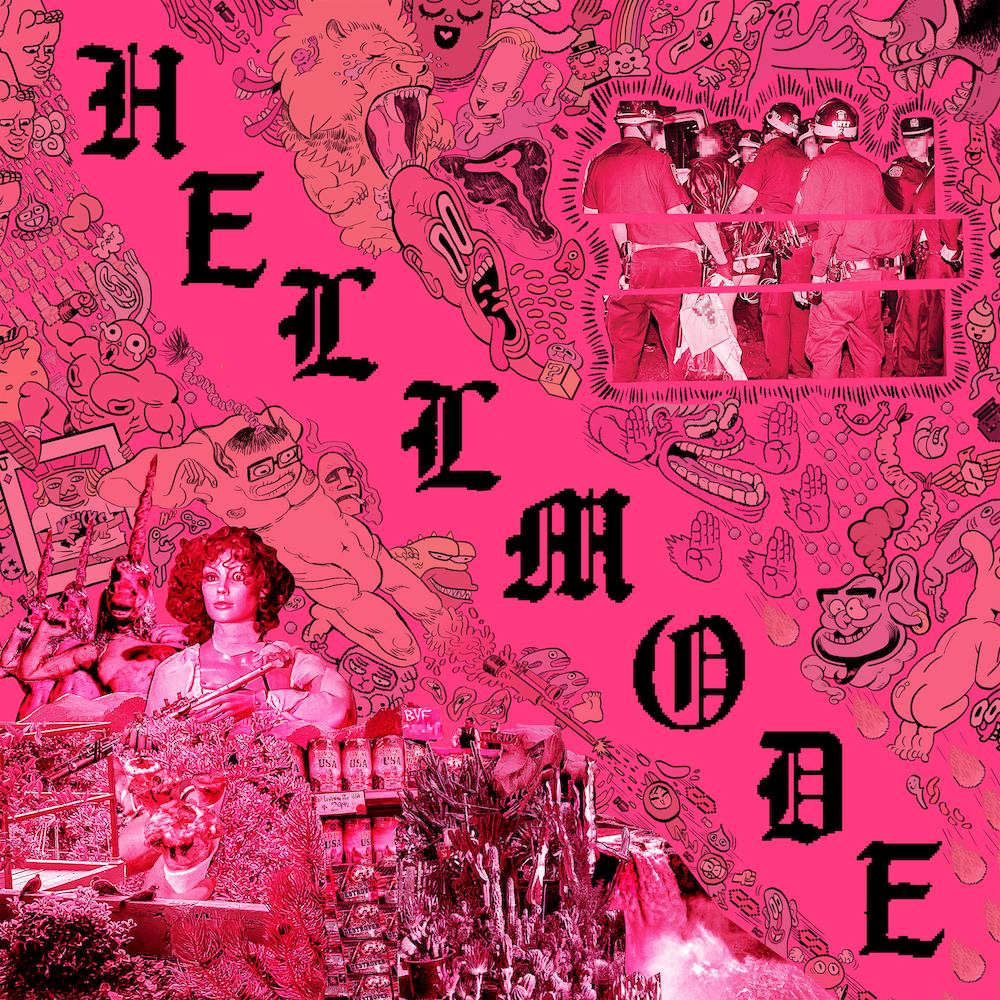
42.
Jeff Rosenstock – HELLMODE
[Specialist Subject]
Throughout his work with Bomb the Music Industry! and recent solo albums, Jeff Rosenstock’s career can be summed up in two words: DIY and loud. While HELLMODE is not fully either of those two things, he finds his signature rawness and emotion through tongue-in-cheek lyricism, gang vocal choruses, and thunderous drum fills. The album navigates its punkiest and most noisy moments by juxtaposing them with pretty acoustic ballads, effectively amplifying the power of the former. While it may be more polished, HELLMODE proves that even a fancy studio session cannot compromise Rosenstock’s punky edge and visceral energy. – Dana Poland
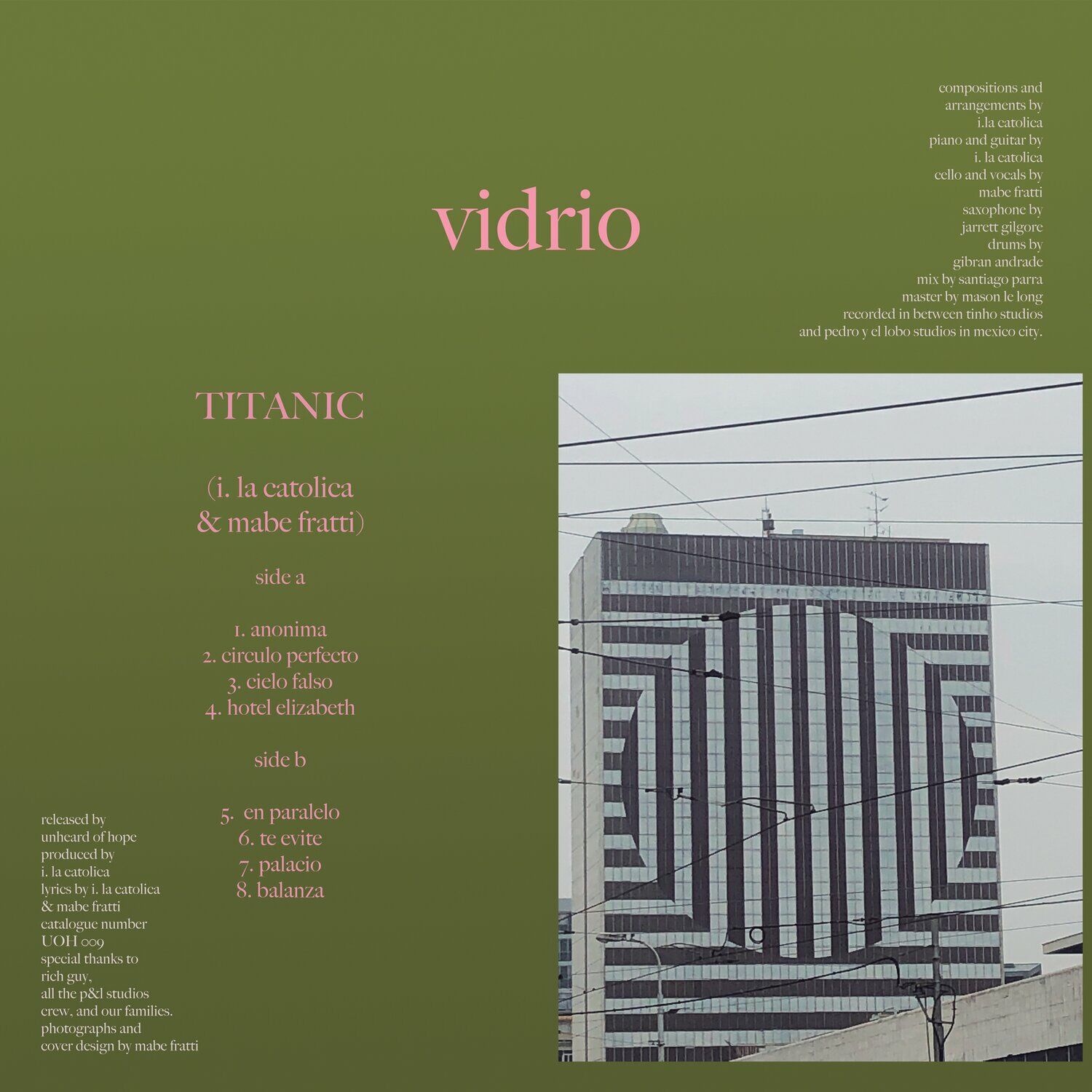
41.
Titanic – Vidrio
[Unheard of Hope]
Sometimes albums just seem to resonate with the joy of collaboration, which is precisely the case with the duo of Guatemalan cellist Mabe Fratti and Mexican multi-instrumentalist Hector Tosta (aka I. la Catolica). On Vidrio, their debut album as Titanic, they treat the studio like an aural canvas and, musically bouncing off each other, throw all sorts of shapes, instruments and styles at it. The results combine modern jazz and modern classical, finding plenty of pop somewhere in between.
Each new song sees them setting off at a new angle to explore their chemistry. We have the sweeping classical synth pop of “Cielo Falso”, the seedy sax inquisition of “Hotel Elizabeth”, the campy 80s fantasy realm of “En Paralelo”, the glacial “Palacio” which morphs from piano-and-strings dirge into fluttering jazz and back – no two tracks are the same. In these various styles, they sweep us across bright and involving landscapes, their inspiration indefatigable, the results unpredictable but always mysteriously and magically compelling. – Rob Hakimian

40.
Sarah Mary Chadwick – Messages to God
[Kill Rock Stars]
A prolific run of solo releases across the last decade has established Sarah Mary Chadwick as a modern great – a singer-songwriter who evocatively captures pain like no other. Her soaring yet fragile voice, her darkly humorous meditations on depression and grief, and the arrangements of her songs (alternately soaring and hauntingly desolate) have given way to music that is uniquely visceral and searing. On the follow up to 2021’s stunning Me and Ennui are Friends, Baby, Chadwick begins to switch gears – among the dispatches from the cliff’s edge are odes to recovery and perseverance against the odds.
On opener “Don’t Tell Me I’m A Good Friend” she dutifully attempts to rescue a suicidal friend, reminding him of the “scattered” beauty of this world. But whereas such a sentiment may prove saccharin or cliched in other hands, Chadwick’s sharp observations cut deep thanks to her own personal experience – “we all have times where we rush to the edge and look down”, she admits. These are songs delivered from someone who’s reached rock bottom and had to claw themselves back up. With Messages To God, Chadwick lays a roadmap for more to do the same. – Tom Williams

39.
yeule – Softscars
[Ninja Tune]
It’s worth noting that yeule identifies as anhedonistic, or as someone with the inability to feel pleasure. A scan of softscars’ lyrics – seeped in checked desires, envy, and self-doubt – certainly bears all the hallmarks of an unhappy, if numbed, individual. Also telling is the album’s title, which alludes to the healed-over wounds of self-inflicted harms from the past.
But then there are the sonics, which yeule gathers into formation; a veritable phalanx of weaponized warriors, all directly trained on your pleasure centers. yeule’s eerie, digital sound world has evolved to incorporate heavy doses of 90s art-rock nostalgia, MBV-style walls of distortion, crashing live drums, and saturated shoegaze elements to impressively widescreen proportions. As someone who’s asked myself several times if I might be anhedonistic, softscars proves a simple answer to that question. yeule might not be able to feel pleasure right now, but they sure as hell know how to unleash it upon those of us who, apparently, still have the serotonin reserves left to spike. – Josh LaClair
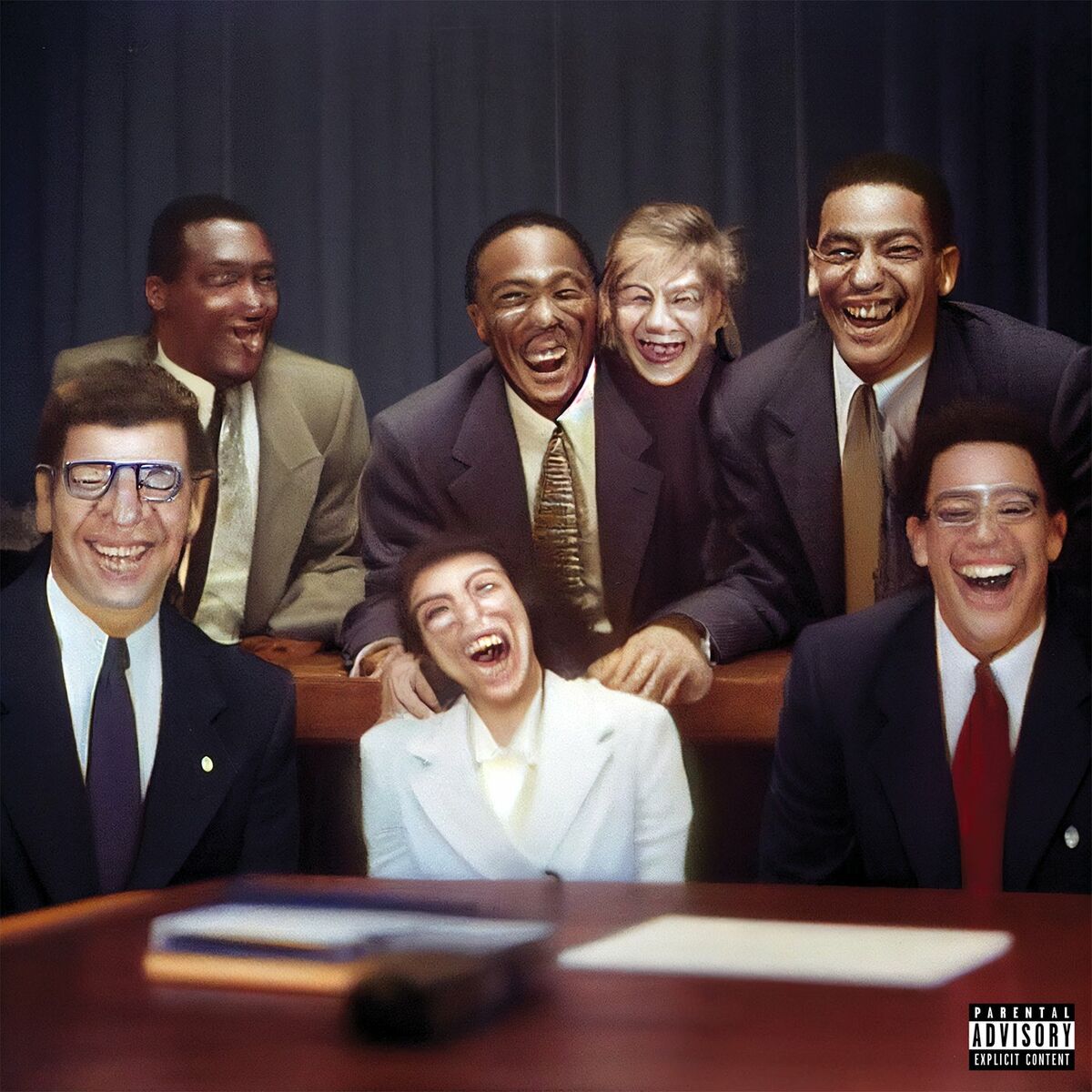
38.
Lil Yachty – Let’s Start Here.
[Quality Control Music/Motown]
While voices in the hip-hop community slammed Lil Yachty’s hallucinogenic overture as a plea to be taken more seriously by white audiences, the reaction in places like the rock subs on Reddit was the opposite: if a rapper can make a credible psychedelic album with little experience, maybe the style isn’t as artistic as presumed. That a stoner epic could cause such clutching of pearls says more about our culture than the music, driving a wedge when the intention was to bridge a gap. Let’s Start Here. at its best is a personal journey: questioning confidence and worth, pushing the boundaries of auto-tune effects, immersion. Whatever the pains were in the making and justifying this record, for Yachty and us it was worth it. – Steve Forstneger
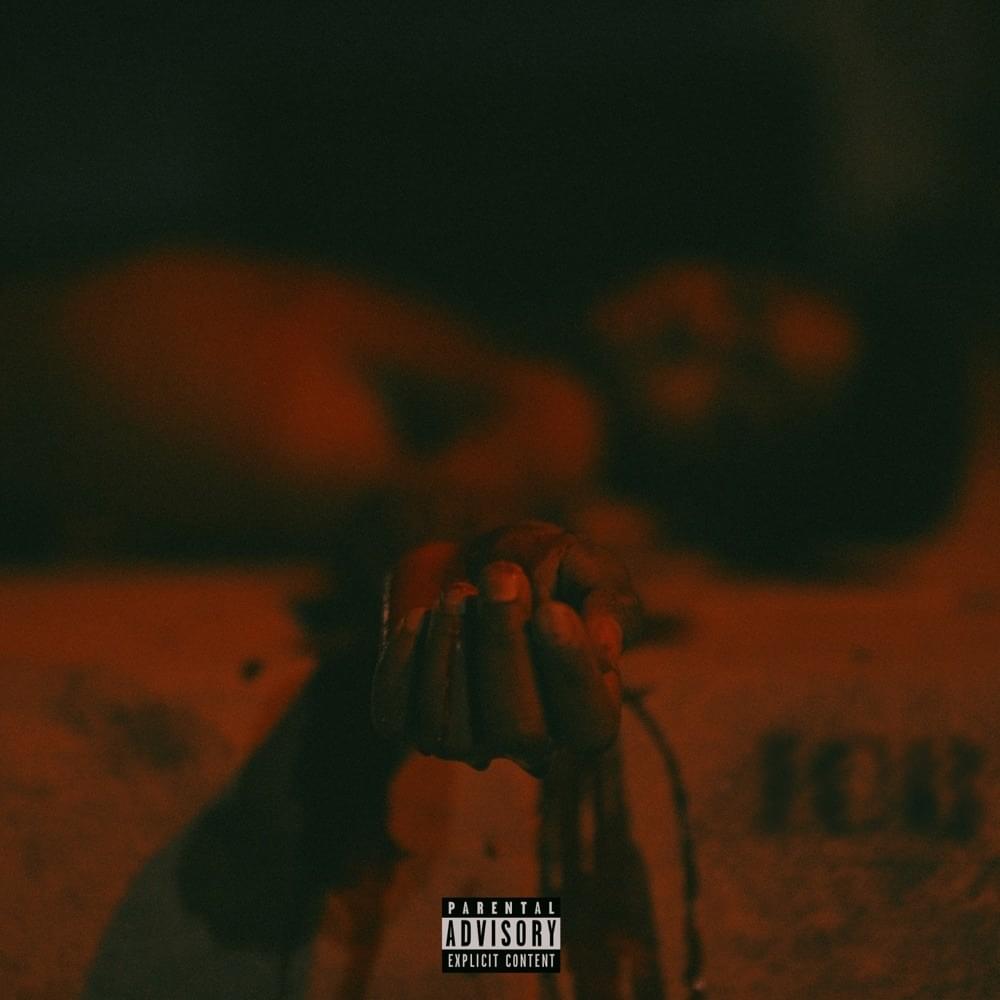
37.
ICECOLDBISHOP – GENERATIONAL CURSE
[Epic]
Drugs. Violence. Revenge. Shattered/toxic families. Grief festering beneath rage. Such are the themes on ICECOLDBISHOP’s debut, the aptly titled Generational Curse. Indeed, ICECOLDBISHOP’s volatile and fast-paced raps point to the realities of recurrent karma and generational trauma. If much current hip-hop accommodates paradigmatic changes, much also addresses how those changes, whether sociological or legislative, are superficial. We’re (still) living into longstanding cycles and repetitions, even if once in a while a lucky someone finds respite from and transcends their circumstances and conditioning.
As a writer and rapper, ICECOLDBISHOP taps into and borrows from the hardcore/horrorcore and gangster modus operandi that have remained hip-hop wellsprings for three-plus decades. His delivery is often reminiscent of Danny Brown, though Brown occasionally relaxes into something resembling humor whereas ICECOLDBISHOP, reporting consistently from the trenches, is unrelentingly confrontive, even if his overwrought style can seem satirical.
On “Candlelight”, for example, he touts his street-cred as a survivor: “Got like four slugs in my heart / got like two drugs in my veins / you ain’t seen two years of my pain.” “I got my TEC-9 before I got my diploma”, he adds on “Out the Window”, before launching into a hooky chorus. On “D.A.R.E.”, he speaks to peer and societal pressures as well as the systematic nature of addiction (“My cousin did it first now she got no veins”, “my daddy did the dope so is it cool if we share a line?”). “Last Night” points to the unreliability of friends and acquaintances, doubling down on the “you-can’t trust-anyone” motif. Trinity Jefferson & Ashley Rose offer a heartfelt entreaty on “Pray for Our Generation”, a sincere interlude that ends with a gun shot.
The album concludes with “Cursed”, featuring the most incendiary vocal on the project. In this way, ICECOLDBISHOP mines the graphic lineages of hip-hop, pummelling heritage templates into his own manifestoes. Over 36 minutes and 13 tracks, he reminds us that survival is far from a given, victory even less probable. The Darwinian/Hobbesian impulse is essential; swagger’s pretty important too. If you can pull off both, even better. – John Amen
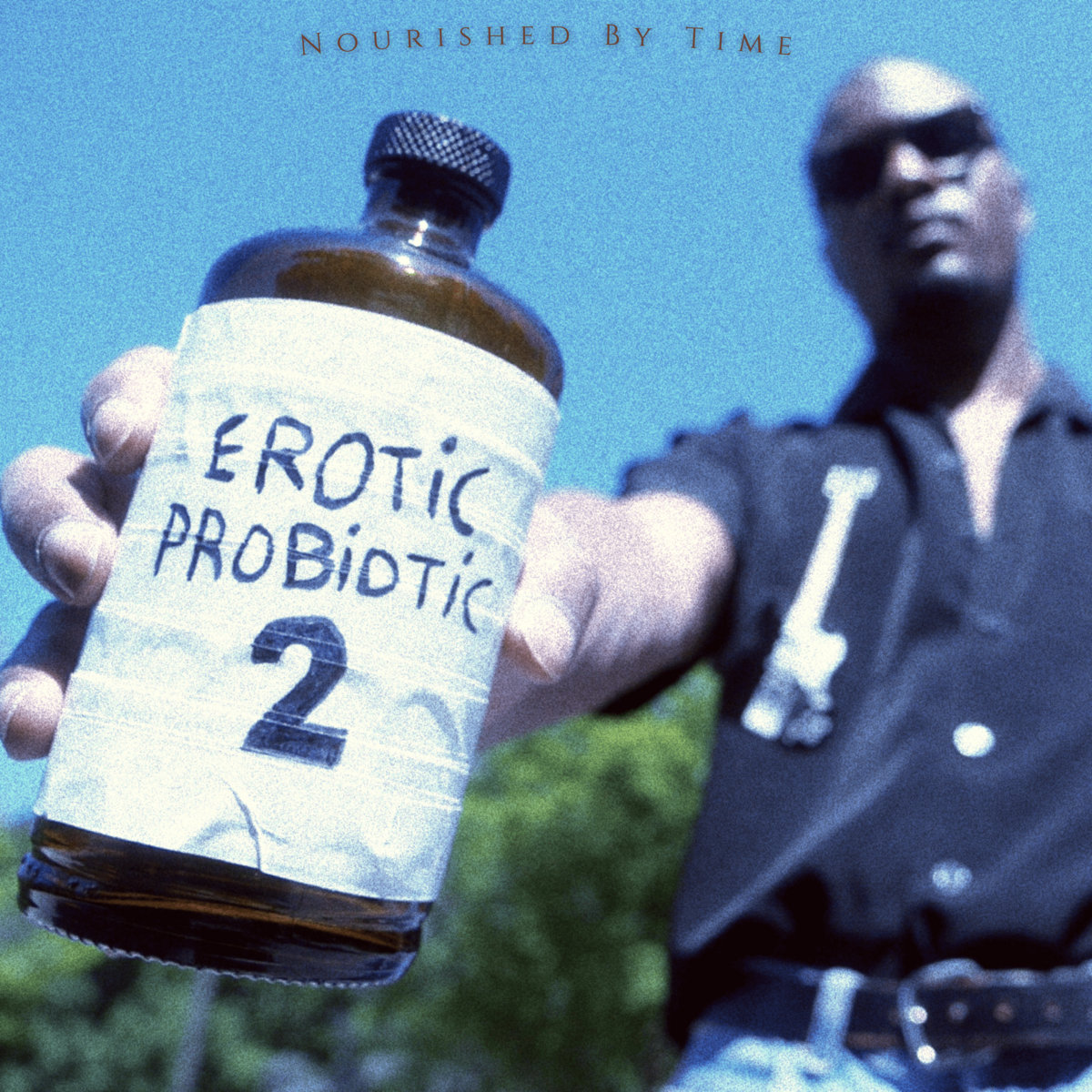
36.
Nourished By Time – Erotic Probiotic 2
[Scenic Route]
Since 2019, Marcus Brown has been releasing singles and EPs as Nourished by Time (including the two-track Erotic Probiotic), in total about an album’s worth of material strong enough to rival that of most contemporary R&B/pop artists. That is until Erotic Probiotic 2, which lapped his previous output and finally gave the artist some deserved love: Oneohtrix Point Never recently described Nourished By Time as the “only new music I absolutely swear is next level”, and this coming from an artist as consistently on the vanguard of both experimental and pop worlds as OPN is high praise. But Erotic Probiotic 2 warrants this claim.
A one-man production, Nourished By Time’s music averts current pop’s too-many-cooks syndrome, while still containing songs as catchy and hummable as any pop artist. Opener “Quantum Suicide” itself is a revalation, a banger and a prayer: “The journey, the pain / May it all be the same,” he belts (and there is a lot of fantastic belting on here). Late in the album, “Soap Party” provides a darker, more introverted vibe and “Workers Interlude” follows as a brilliant reflection on personal and historical realities of the oppressed. Erotic Probiotic 2 is a watershed moment for Nourished by Time, and almost certainly a harbinger of more next-level shit. – Ethan Reis

35.
Arooj Aftab, Vijay Iyer & Shahzad Ismaily – Love In Exile
[Verve]
After spending some time with Love in Exile – the spacious and open-ended collection of songs from Arooj Aftab, Vijay Iyer and Shahzad Ismaily – it becomes readily apparent that music can be presented as a tangible thing, a space for wandering and for tactile sensation. These songs are fluid, revealing a gathering of dense concoctions, celestial forms roaming and coalescing into tones and textures only approachable by submersing ourselves in their collective consciousness. Between Aftab’s hypnotic voice, Iyer’s electroacoustic atmospheres, and Ismaily’s circuital bass infrastructure, the album sprawls and unbinds itself from genre limitations, offering immersive soundscapes that crowd out the surface noise of our lives.
Love in Exile, much like Aftab’s 2021 album Vulture Prince, positions sound as an avenue through which we can express momentary reflections of the divine, of something larger than ourselves. Maybe we seek direct communion with a higher power, or maybe we’re searching for more terrestrial revelations. Whatever our individual pursuit, these songs provide a place where we can investigate the details of own motivations and the consequences which may yet present themselves. Dreamlike, hymnal, and wrapped like a cluster of nebulas across our shoulders, this album isn’t here to provide answers. There’s no intent for clarification. We take away only what we bring into the swirling vastness of this music – questions begetting questions, and answers revealed slowly as hearts are drawn open and quietly observed. – Joshua Pickard
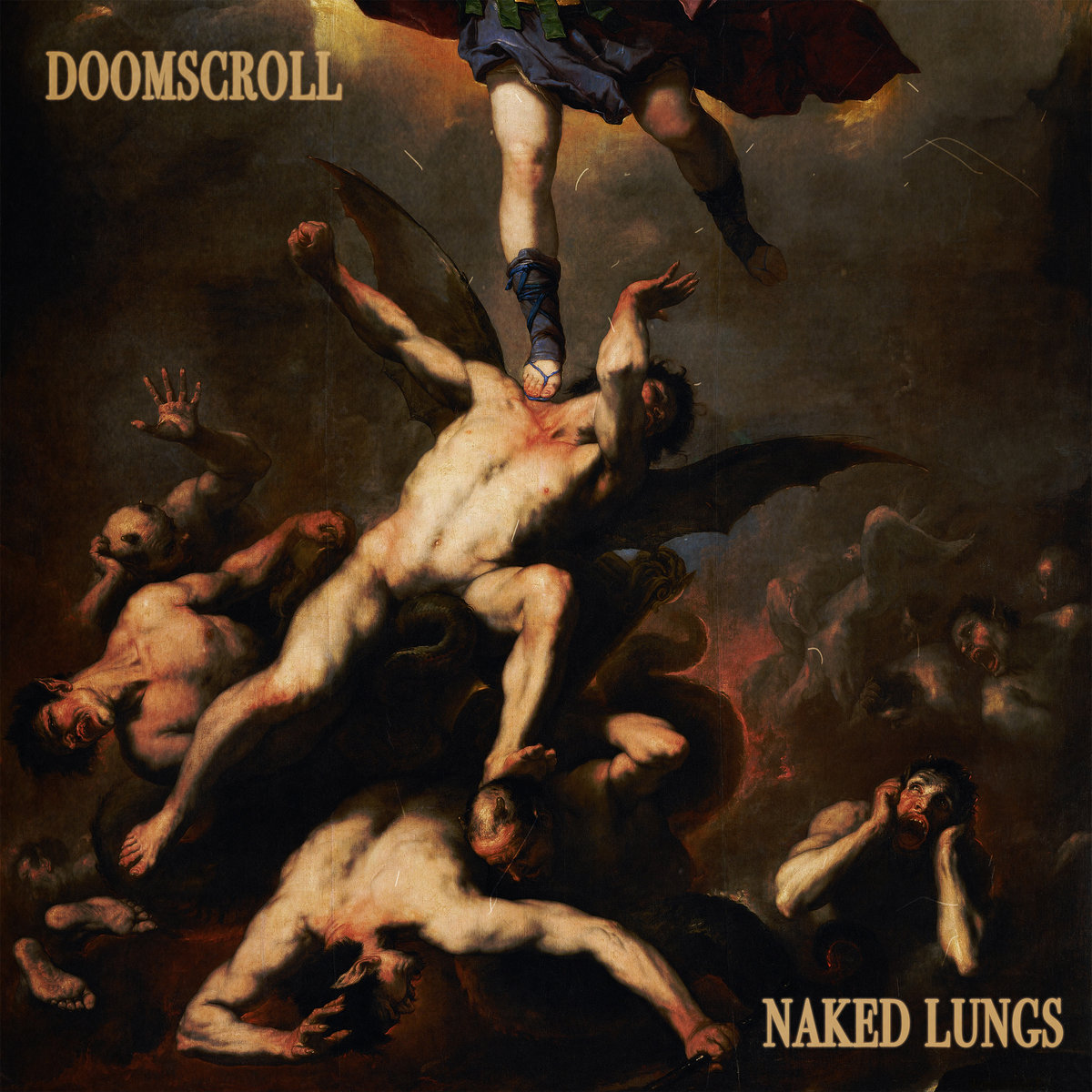
34.
Naked Lungs – Doomscroll
[Self-released]
The most acidic of the three Futurismus albums that exploded onto the world this year, Naked Lungs‘ Doomscroll bursts with the violent grief of a Yūrei and the manic, insane laughter of a man with an immovable smile burnt onto his lips. A cousin of You Won’t Get What You Want, Metal Box and The Talkies, the Irish band’s debut album is endlessly memorable in its cruel, at times borderline nihilistic glare at late-stage capitalist cannibalism.
The record’s leading image: the red river that bursts forth indomitable (“River (Down)”), which morphs into the paralysing train ride to work (“Relentless”), becomes a gushing mob that witch-hunts the female embodiment of Ireland itself (“Shell”). In the sheer, grim brutality of Doomscroll, Naked Lungs – four thoroughly friendly and gentle young men – stand in the tradition of great Irish minds who see stark rebellion as the only viable response to oppression.
This spirit of upheaval comes in shrieking madness, such as on opener “Gack”, where singer Tom Brady erupts in a coda of shouting “Ominous”, over and over, until his voice breaks. It manifests in the accompanying, blood-red coated music videos, jawdropping in their depictions of violence, occultism and addiction – works inspired by bassist Matthew Pyper’s interest in transgressive cinema. Or in the unique, flesh cutting tone of Andrew Connaughton’s crystalline, non-euclidean guitar compositions, that meet Ryan Mortell’s cannon-thunder drums to create sound-forms that mirror the horrific hellscapes of early 20th century painters . An angry, rioting funeral procession of the absurdities this decade has told us to accept as normal, it’s one of the greatest punk records ever recorded, as bitter and angry as it is gorgeous and necessary. – John Wohlmacher
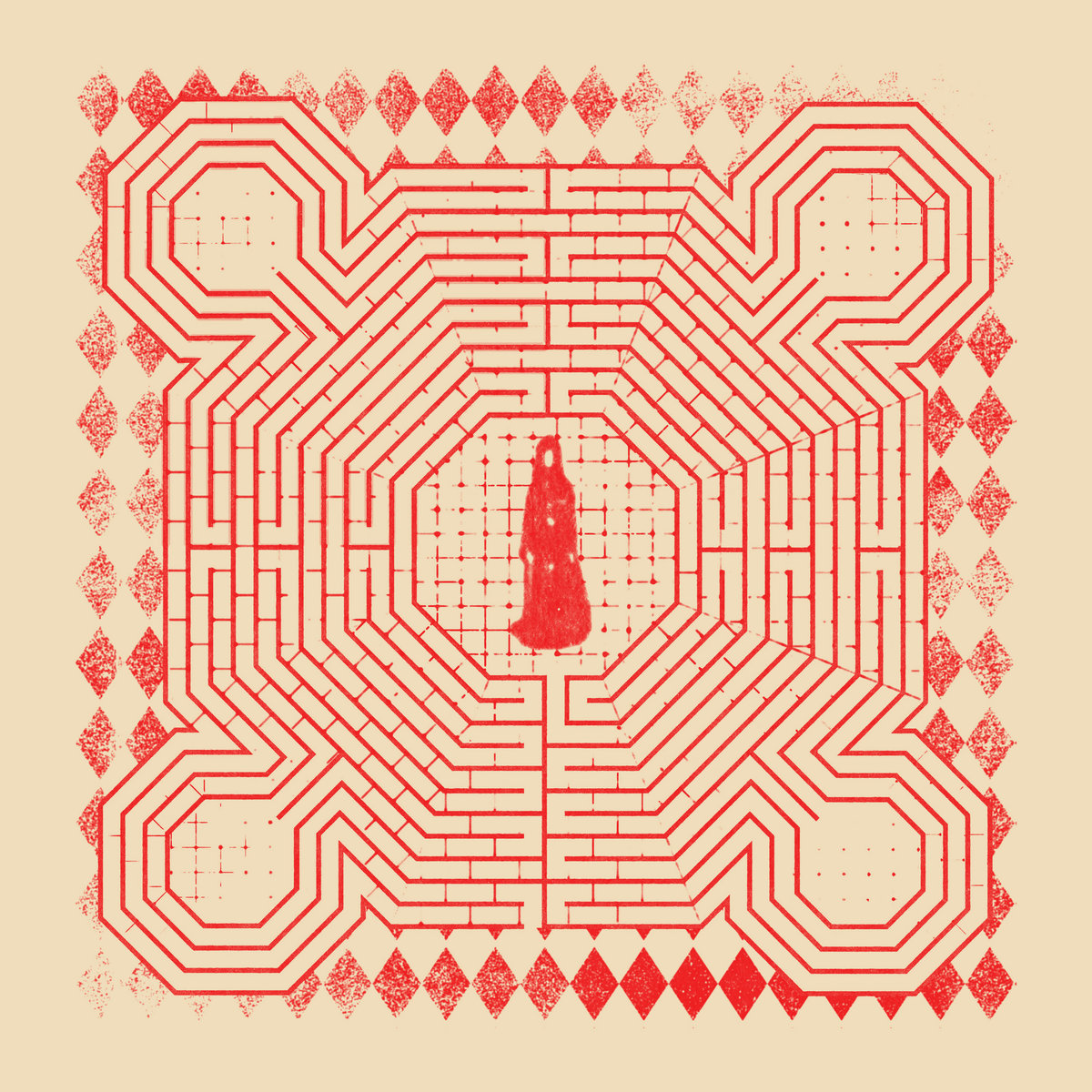
33.
Slowdive – everything is alive
[Dead Oceans]
Talk about music befitting its artwork: Slowdive’s everything is alive is a labyrinthian journey. The legendary shoegaze act’s second album since reuniting feels new even for a band so storied, resistant when you’d expect them to be smoothly locked into place.
More than ever, their music seems to emanate from a vague distance, as if it’s unfurling from some unseen, foggy place, unknowable. It’s beautiful, if somewhat painful, with the likes of “prayer remembered” feeling like an open wound.
The pain is understandable: everything is alive was initially conceived during the pandemic, with two of the band’s members losing parents. However, as its title readily suggests, this is music for staring loss in the face and opting for hope, rather than being consumed by it. It’s wistful, to be sure, but never overwhelmed. everything is alive is a weathered, sturdy companion.
everything is alive is equally suited at low volume for thoughtful evenings past your bedtime, or at full blast on headphones during a meandering walk. Listening feels akin to roaming steep hills on a quiet night in a place you’ve never walked before. It’s music that demands to simply go somewhere together, something a tad magical for music borne of a time in which we were all stuck in one place. – Chase McMullen

32.
Sigur Rós – ÁTTA
[BMG]
After some years away, ÁTTA is just the lovie needed from Icelandic band Sigur Rós, who soothe with sensitive vocals and graceful ambience. Accompanied by a 41-piece orchestra conducted by Robert Ames, the 10 tracks listened to in sequence brings you as close as possible to the 2023 tour experience.
The band’s hiatus may have seemed predictable, their decade was rife with touring, scandal, frustration over climate change and legal issues. While ÁTTA is s significant departure from their 2013 release Kveikur, it finds the trio of Jón Þór “Jónsi” Birgisson, Georg Holm and the returning Kjartan Sveinsson (who’d left the band in 2012) reminding us that Sigur Rós write poetry that does not require translation. – Kristy Sawyer
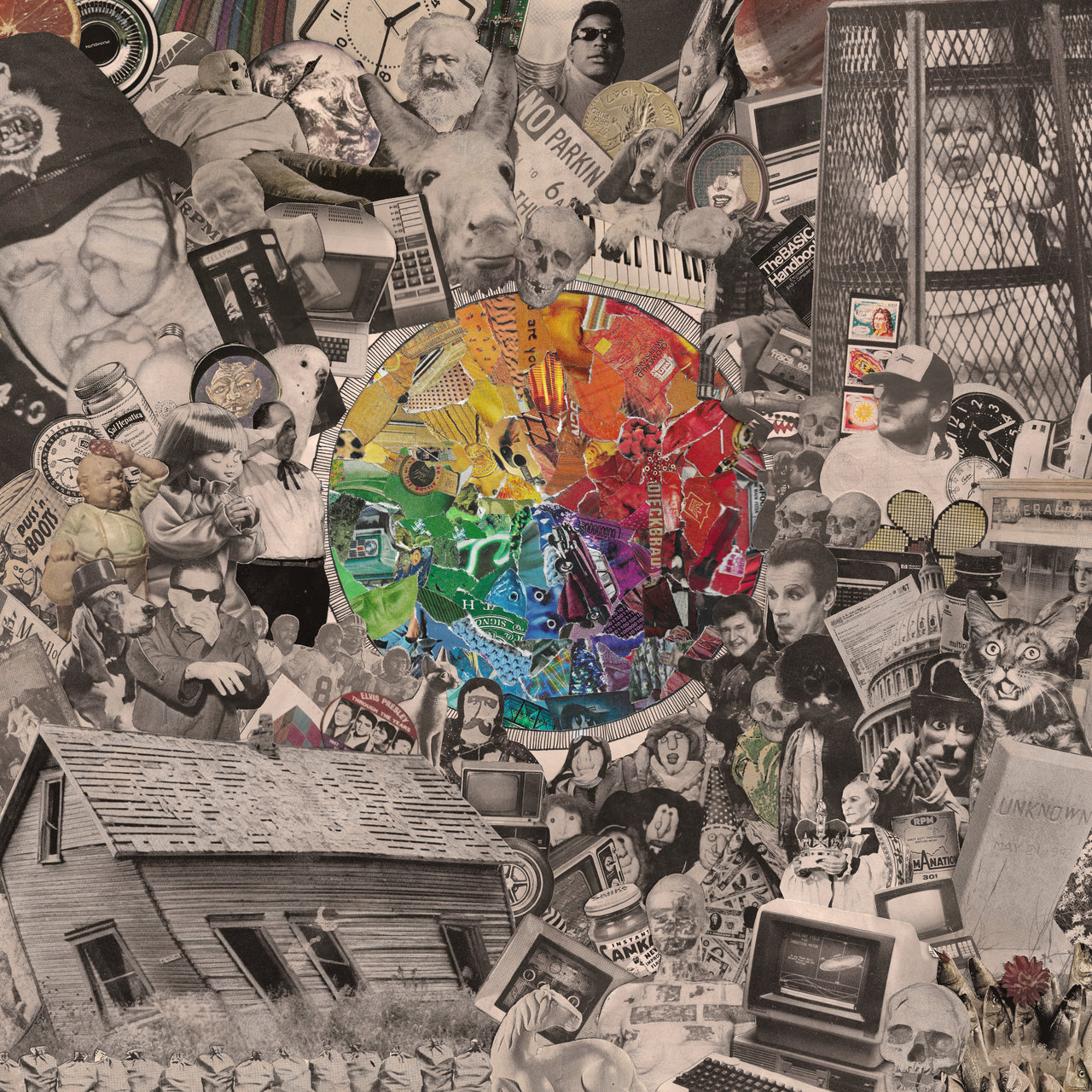
31.
Dougie Poole – The Rainbow Wheel of Death
[Wharf Cat]
“The real actual themes in country music are not so much, like horses and trains or, you know, whatever, it’s like that’s sort of what the stereotype is. But really what country songs are about, work and love and loss and death and those things – I mean, I guess that’s sort of what everything is about.” –Dougie Poole speaking with Aquarium Drunkard, 2023.
Presenting the Album About Everything: The Rainbow Wheel of Death. Previous records by Dougie Poole were more conceptual or singular in tone, but Rainbow Wheel is his best record (so far) because it isn’t overly thought-out. Rather, we get a panoply of killer songs ranging from the prom-pop of “High School Gym” to the stunning dysphoria of “Nothing on This Earth Can Make Me Smile”. Poole’s creativity and fixation on death echo a young Neil Young, but his voice is more James Taylor: most of these songs can be lullabies if you let them, especially the tender closer “I Hope My Baby Comes Home Soon”. Another thread is the clean and crisp sound of this album, which is destined to become a fried-cowboy classic released during country music’s biggest critical and commercial renaissance of recent memory. But truly, I would recommend The Rainbow Wheel of Death to anyone who loves good songs. And a taste for pedal steel doesn’t hurt. – Ethan Reis
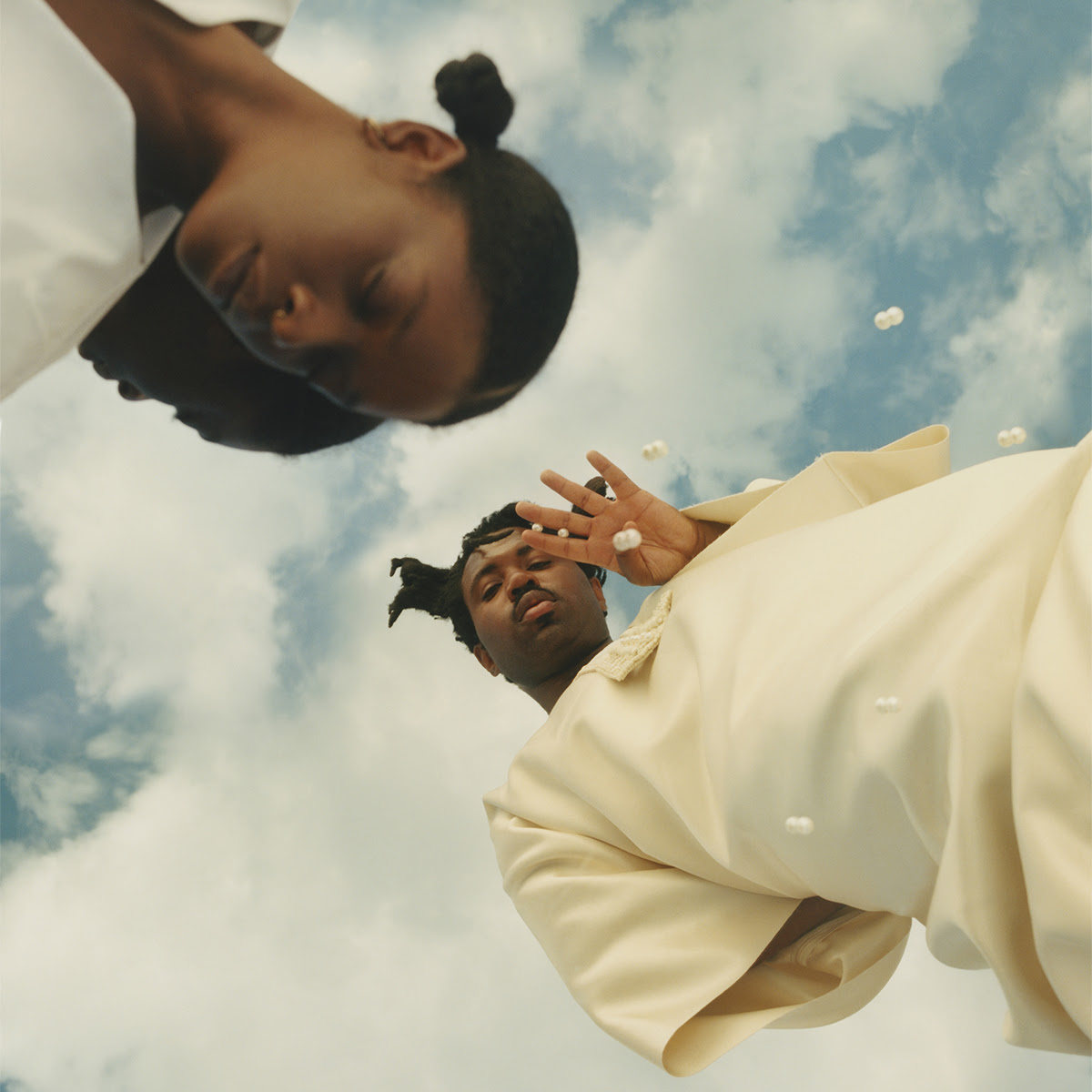
30.
Sampha – Lahai
[Young]
A six-year dry spell is long for any band or artist, but with Sampha, this time was magnified tenfold. In 2017, he came to us with Process to do what artists of his emotional gravity tend to do: process. To this day, his debut stands as one of the most heartrending releases of the past decade. But as soon as he arrived to bless us with his gifts and vulnerability, the generational talent faded into the background, though was not forgotten. For years, we had all yearned for the crooning empath to grace us in full again, and by God, it was worth the wait.
On his latest full-length, Lahai, Sampha delivered an album of immense musical evolution replete with an emotional intensity that surpasses the intimacy of Process through soul-baring musings upon time, spirituality, familial connection, and profound love of everyone within his proximity. But Sampha leaves listeners most in awe with his versatile musicality and his determination to make every moment a shape-shifting marvel.
Each minute on Lahai bleeds into the next with perfect poise, intertwining neo-soul and electronica with harmony and complexity. It’s a level of complexity that even exceeds that of Process to include propulsive breakbeats and full-bodied string arrangements which sound as if they were composed by aliens residing in heaven. Miraculously, the ethereal and mechanical intermingle with unshakable composure — nothing ever feels at odds, which only allows the humane essence of his resounding soulful voice, constantly in-mourn, to still take center stage. Lahai is Sampha’s bold and singular artistic statement, a testament to his growth and deepened introspection. – Kyle Kohner

29.
Parannoul – After The Magic
[Poclanos/Topshelf]
There is an exhilarating, life-giving essence about Parannoul that’s difficult to conceptualize, let alone comprehend. This has nothing to do with the continued anonymity of the South Korean artist but the beautifully inexact emotions their music elicits from their listeners. Feelings can oscillate between nostalgia and an anticipation for something bigger and beyond, as if your body was on the precipice of diffusing into the greater universe and across dimensions unbound by time.
After The Magic elicits these precise, inexact emotions while leaving room for the imagination to roam with sense of purpose — and it’s because of Parannoul’s ability to masquerade intricate minimalism as maximalist grandeur. From the most modest of means and setting, this one-person band somehow devised a celestial symphony of intense multitudes. It lifts you into another plane but keeps you grounded to the familiar and miraculously in awe of your surroundings that you’d usually deem mundane. It offers beauty resting not in words, but in the radiance it emits and the emotional response it so graciously requires from you.
Now well-positioned beyond the South Korean underground of shoegaze, After The Magic is a peek into what shoegaze will sound like rather than what it has sounded like. It’s not about staring down at the ground, enraptured with introspection, but rather, lifted, stirred with the feeling of the sun burning within, not in pain but a comfort that everything is ok if you look up. – Kyle Kohner
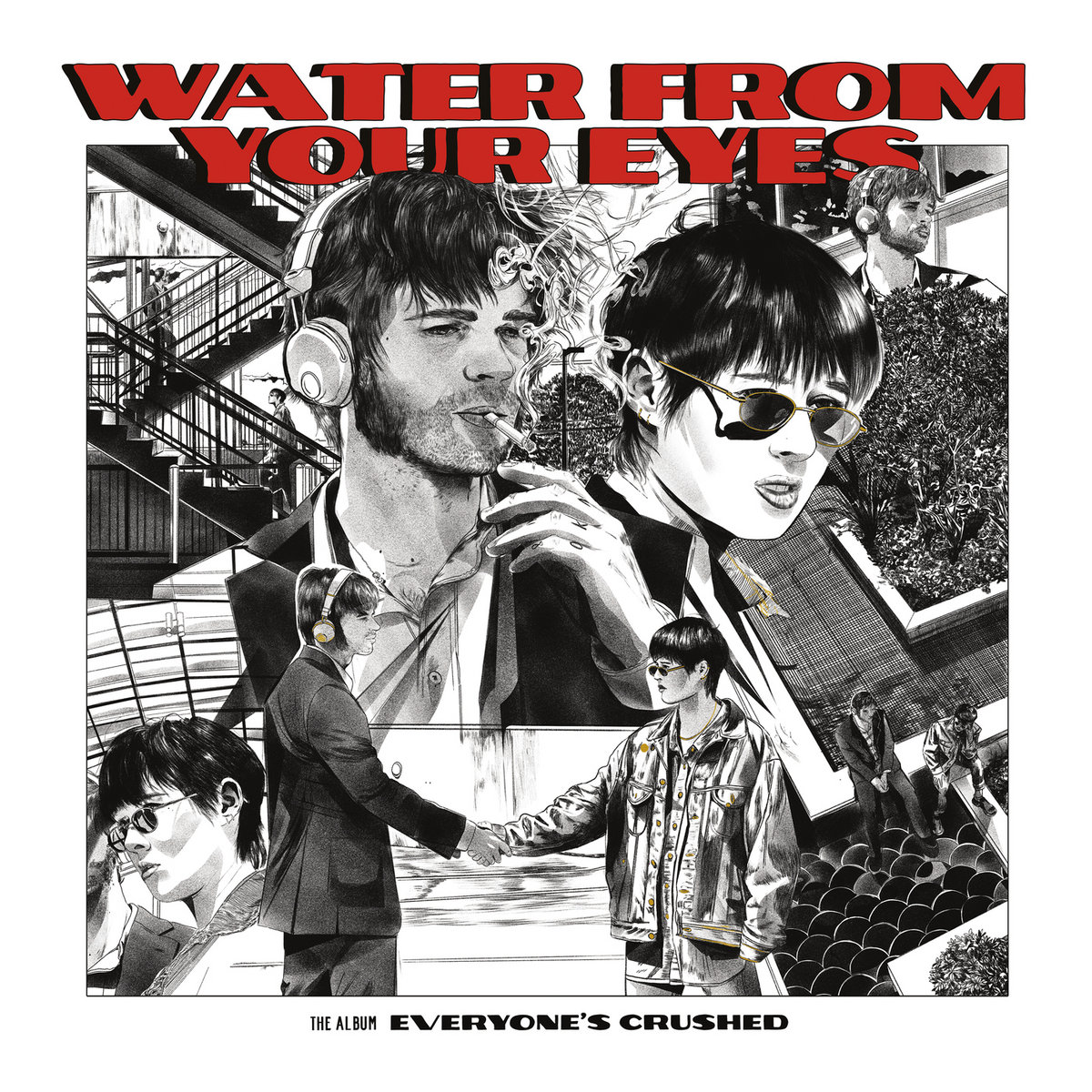
28.
Water From Your Eyes – Everyone’s Crushed
[Matador]
Rachel Brown and Nate Amos don’t so much dig rabbit holes for listeners to dive into as they do paint them on the ground for you to crash into à la a Looney Toons characters. Deciding how serious to take their music is an exercise in balance and dedication. Their seventh album as Water From Your Eyes (and first for Matador) starts with a track named after the title of their previous record and ends with a scrappy decree to “buy my product.” In between all that, it’s a half hour of back and forth between poetic chaos and unexpected beauty – or both at the same time, to be honest. If the music wasn’t so exciting and idiosyncratic of Water From Your Eyes’ style it might be unbearable. Thankfully that couldn’t be further from the truth. Jump into “Structure” (the song, not the album) and see for yourself. – Ray Finlayson

27.
Jess Williamson – Time Ain’t Accidental
[Mexican Summer]
For every mile walked or driven in the world of Time Ain’t Accidental, there are countless stories to be experienced, moments filled with wrought-iron love torn apart and repurposed, frozen just before consequence is exposed, leaving us bare in all our resolution. Jess Williamson deals in cycles of emotional upheaval – endings, beginnings, revelation, and catastrophe all blur together in a disconcerting truthfulness. Time Ain’t Accidental offers both emotional vagaries and specific insight into a life riven by weary roads, choices hardened by necessity, and the bucolic rhythms of classic country music. Guitar strings are plucked and strummed, vibrating on frequencies only the desolate and the hopeful can recognize.
Williamson finds herself in constant motion across these songs, moving away from someone, from someplace, from something – rarely settling anywhere for very long. But there is happiness for a time, before the pull of the unknown draws her back out to the open road. Her voice can be steel and resolute and filled with regret and pain, a humble thing of beauty that convinces us to move along with her, regardless of the circumstances. Between the promise of affection and the spiraling command of outside forces, she sings of love and ongoing on the gorgeous title track, veering away to shuffling percussive atmospheres on “Chasing Spirits” and hypnotic wails on “I’d Come to Your Call”. This is an album reserved for transient realities, for people lost to the unending swells of time, and those hoping to find someone to hold on to as the world spins out of their control. – Joshua Pickard
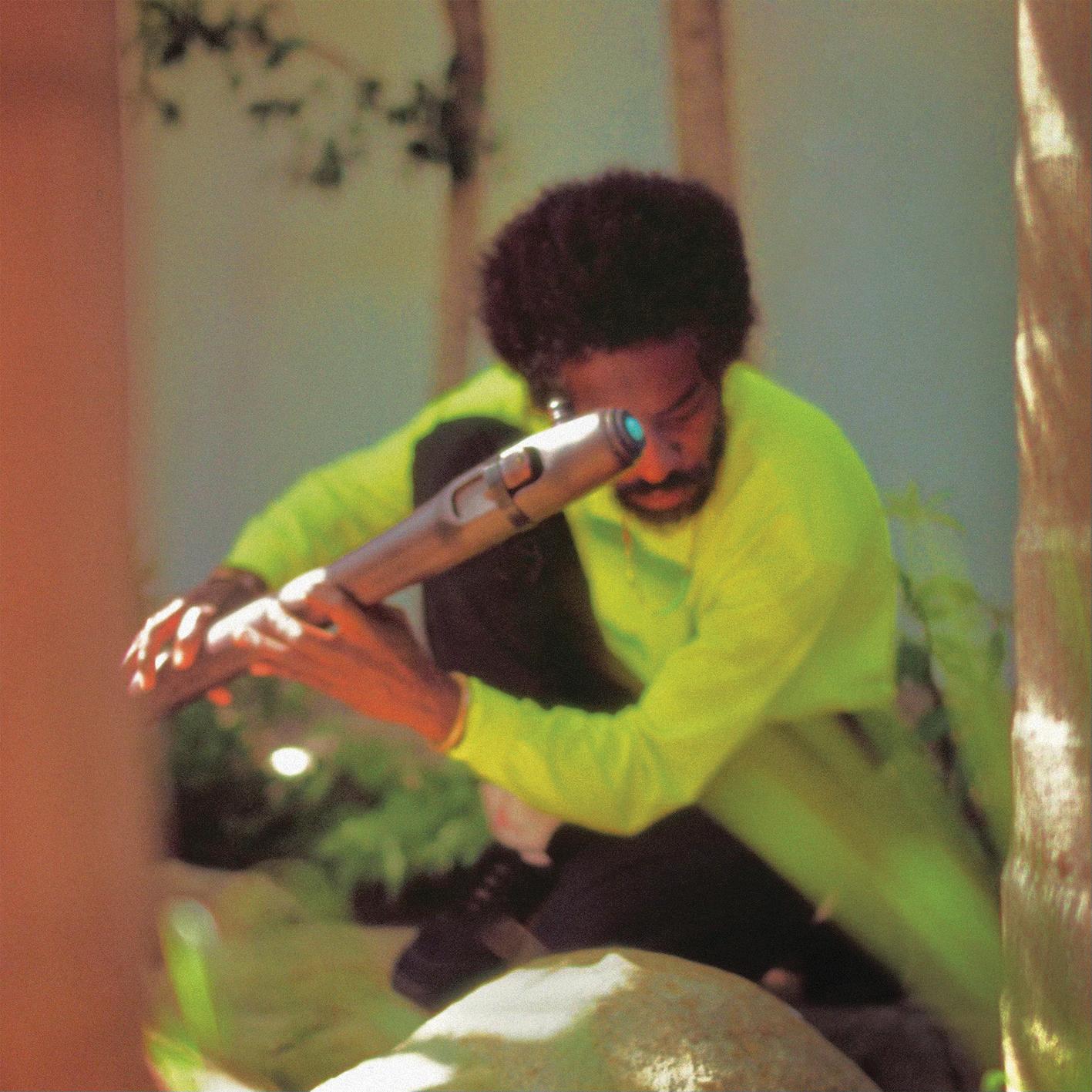
26.
André 3000 – New Blue Sun
[Epic]
What exactly is New Blue Sun, then? Some overly serious music types still object to it being called “Flute music”, and with the textures and processing, it does indeed feel perhaps more akin to ambient or New Age music, but in the end: does it matter? When André 3000 released the LP, despite the general eyebrow raising, it wasn’t truly that surprising for devout fans. Even putting aside his longtime knack for taking left turns and general resistance to being slotted into the position of a legacy artist, Three Stacks had been popping up ‘busking’ the flute in spaces for some time now (an airport, for one, if I recall correctly?). In any case, when the album first arrived, I appreciated its warmth and exploratory nature, but regarded it as more of a curiosity from a notoriously stubborn genius.
Yet, with each passing day since, I’ve found myself drawn back to it. Whether first thing in the morning, commuting to work, or to dispense stress just before bed, it’s been an inviting, warm companion. It’s certainly far more than a vanity project, possessing a very genuine sense of curiosity and adventure. With echoes of Harold Budd, Floating Points, and many more, it’s a surprisingly accomplished, reflective work from an artist that many would likely consider a novice in the field. Perhaps it’s that very willingness to stumble that makes it so successful, with the album seeming to find its footing as the music unfurls, yet never seeming clumsy or without depth.
Some have objected to the notion as to how bold the change in direction is from 3000’s hip hop, arguing that lesser known artists make more drastic turns all the time, and that the elder statesman is taking away attention from those very artists. To this, I’d disagree: a left turn from an unknown artist is often in search of a wider audience, more based on need than desire. Needless to say, André Benjamin very much has an audience, and to risk alienating them entirely, and to so greatly succeed while doing so, is no small thing. Let’s just hope there’s more of this to come. Or perhaps he’ll all but vanish again. We can remain grateful he offered this. – Chase McMullen

25.
Mandy, Indiana – i’ve seen a way
[Fire Talk]
Some ways to describe i’ve seen a way: an artificial intelligence coming to life amidst the charred remains of a dystopian fallout; the sound of metallic gears grinding and galvanising in a dingy Berlin club; an alternate soundtrack to any of the John Wick films; a disruptive and corroded indictment of the surrounding world. All are separately and simultaneously true of Mandy, Indiana‘s striking debut album. Shards of Kid A/Amnesiac linger on “2 Stripe” while “Peach Fuzz” implodes in on itself. Keeping you on your toes throughout, i’ve seen a way thrives in its unpredictability. The gorgeous velvety neon synth arpeggios on opening track “Love Theme (4K VHS)” beckon you in with an almost Lynchian allure, but from there you’re left to fend for yourself. Sit back and enjoy, take up a weapon and fight through it, or just dance amidst the chaos. All options are valid and necessary. – Ray Finlayson

24.
L’Rain – I Killed Your Dog
[Mexican Summer]
Despite its recent arrival in mid-October, I’ve probably played the phenomenal I Killed Your Dog by avant-songwriter L’Rain at least a dozen times more than any other album released in 2023. It’s a masterclass in sequencing and mood, textures and emotions, with disparate influences and lustrous melodies all blanketed in a warm psychedelic haze.
Oh, and about those influences. Yes, some of her guitar work is reminiscent of The Strokes, and her vocal stylings can, at times, recall the honey-glazed coos of Brandy. Lesser evident, but equally crucial, however, are the complex yet transcendent chord progressions and harmonies that echo those of the mystical, insanely underrated folk singer, Judee Sill. Just take a listen to album centerpiece “5 to 8 Hours (WWwaG),” and within the first minute, you’ll be hit with some of the most affecting, spine-tingling chord changes and harmonics this side of Sill’s heavenly “The Kiss”.
While this is clearly a standout track, the rest of the album is brimming with comparably spectral, trippy delights. Trimmed of all excess and imbued with levity and gravitas, sweetness and sourness, I can confidently recommend this album to you if you’re reading this publication. Just don’t blame me when it’s all you want to listen to for the rest of the year. – Josh LaClair
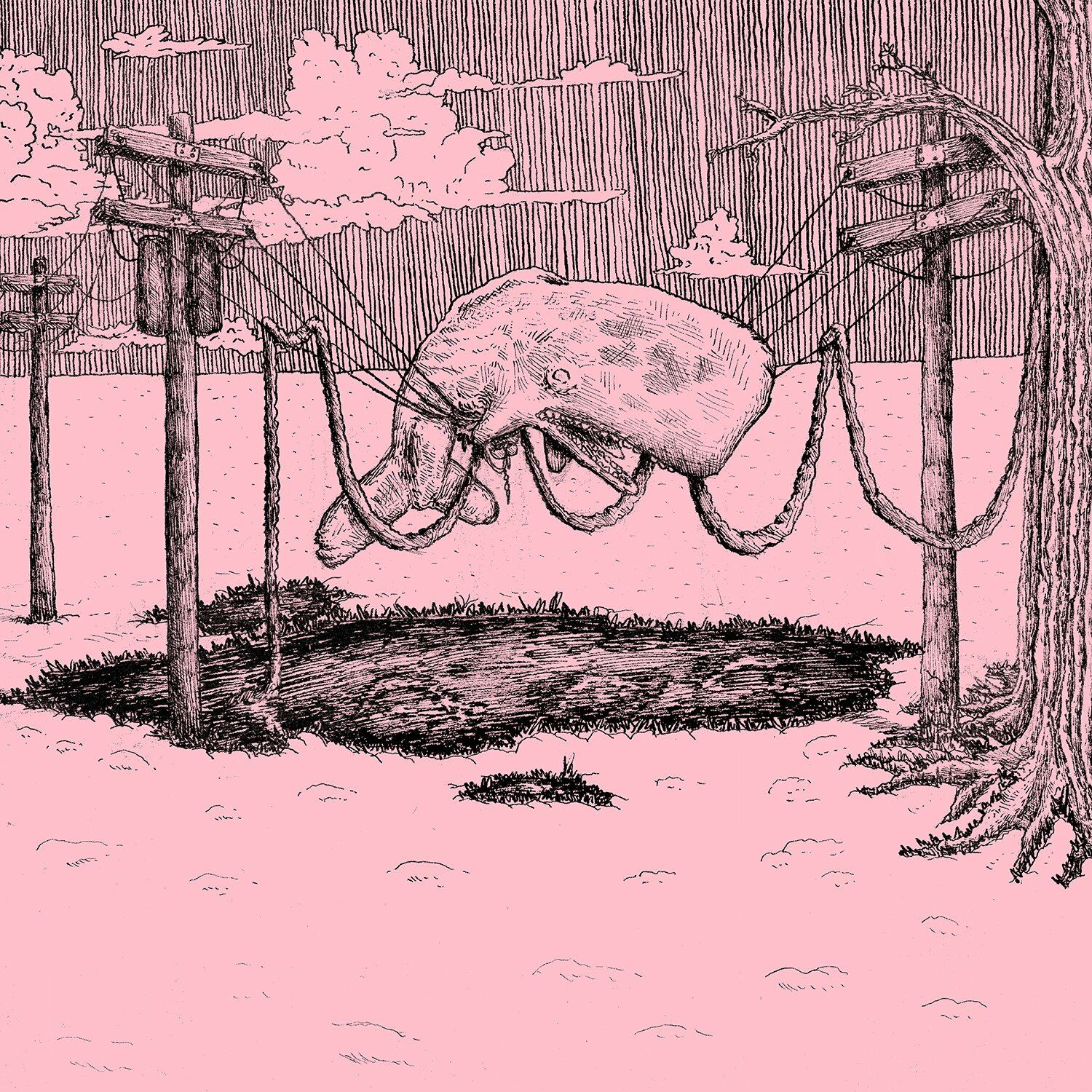
23.
Home Is Where – the whaler
[Wax Bodega]
I’m a grown ass man in his late 30s and Home is Where are the kind of band that make me want to buy a pencil case just so that I can emblazon it with a lovingly laboured-over biro rendering of their band logo and make my fandom plain for all of my peers to see.
The Florida emo act harken back to early to mid 00s indie – i.e. the kind of music that the phrase “this band might save your life” was created for – when acts like Arcade Fire, Clap Your Hands Say Yeah, and Wolf Parade were standing on the shoulders of the anthemic weirdo-folk of Neutral Milk Hotel and the other big hitters of the Elephant 6 roster to paint big emotions in even bigger musical gestures. Home Is Where are looser and wilder than those bands, with screamo from the same era having a tangible influence on their more explosive moments.
Singer Brandon MacDonald, when she isn’t screaming like she’s fronting a ramshackle skramz band, has a strained vocal register that sounds like the two Jeffs, Mangum and Rosenstock, had an excitable lovechild. Her performance is the emotional lightning rod at the center of the whaler’s blood and viscera-splattered folk-punk tapestry, just as her and her bandmate, Tilley Komorny’s experiences as a trans women in an American society sliding seemingly irrevocably into reactionary, right-wing oppression and bigotry are central to the worldview the album so vividly, poetically and disturbingly captures. Home is Where have built admirably upon 2021’s hugely promising I Became Birds and created something that, had it come out in 2003, would be a fondly remembered classic, but is also timeless and relevant enough to be an instant classic upon arrival in 2023. – Andy Johnston
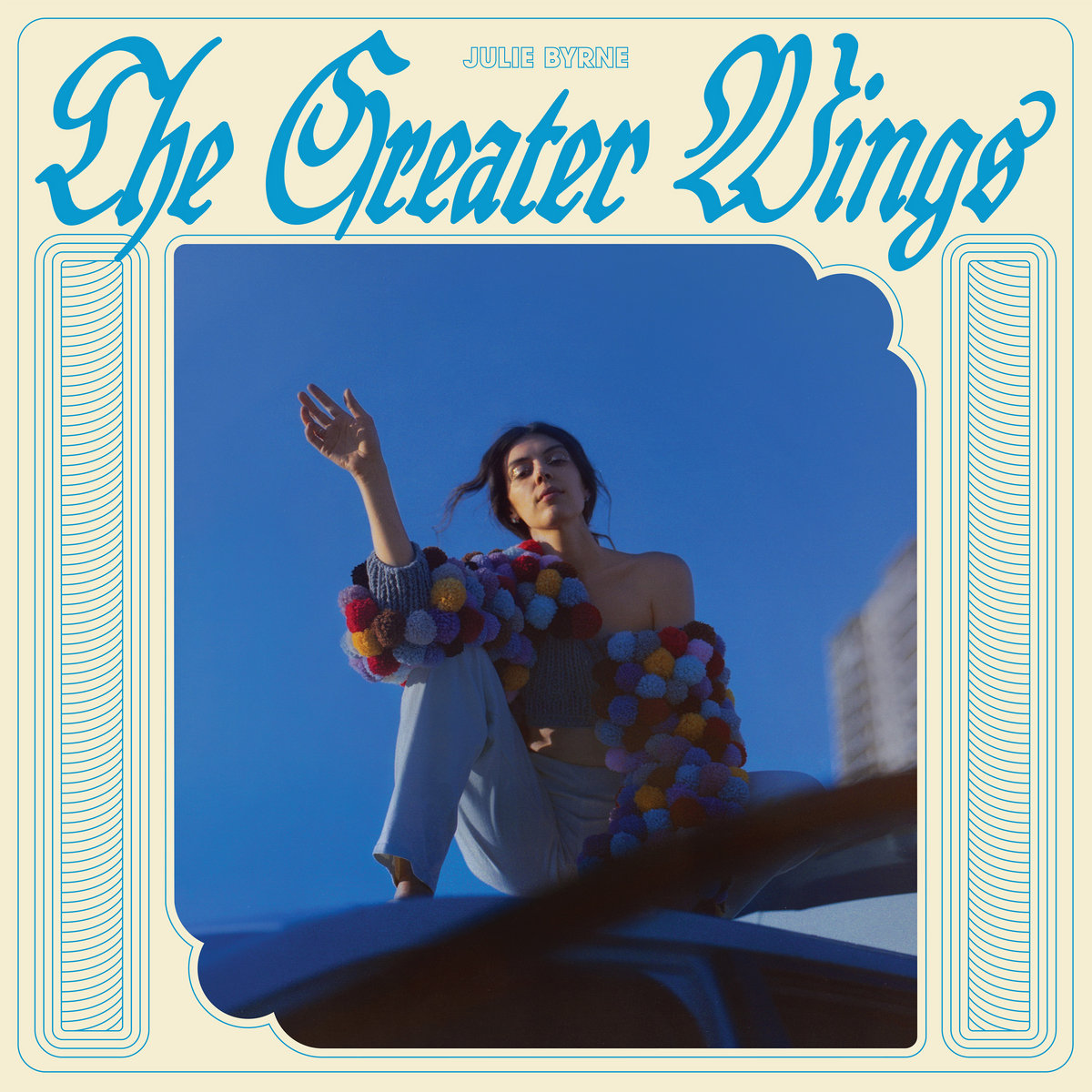
22.
Julie Byrne – The Greater Wings
[Ghostly International]
Julie Byrne‘s third album The Greater Wings is a record that is what you need it to be. Though the presence of death lingers over it (her producer, synth player, and longtime collaborator Eric Littmann died unexpectedly during its creation), Byrne doesn’t let the spectre of mortality loom over it. Instead small details of everyday love unveil themselves through human interaction and self-reflection.
On the gorgeous “Moonless” she decrees “I found it there in the room with you / Whatever eternity is”, whereas later on during “Flare” she aches “Remember our time for years to come” over percolating fingerpicked guitar and vapor-like strings. Punctuated by mentions of the surrounding galaxy, Byrne’s voice is carried across the album by rich, rippling harp strums, and glistening synths. Her music gently reaches up towards the stars and back. Through hard times and the elated sweetness life offers, with its exquisite musical flourishes, The Greater Wings gives you that lift you need. – Ray Finlayson
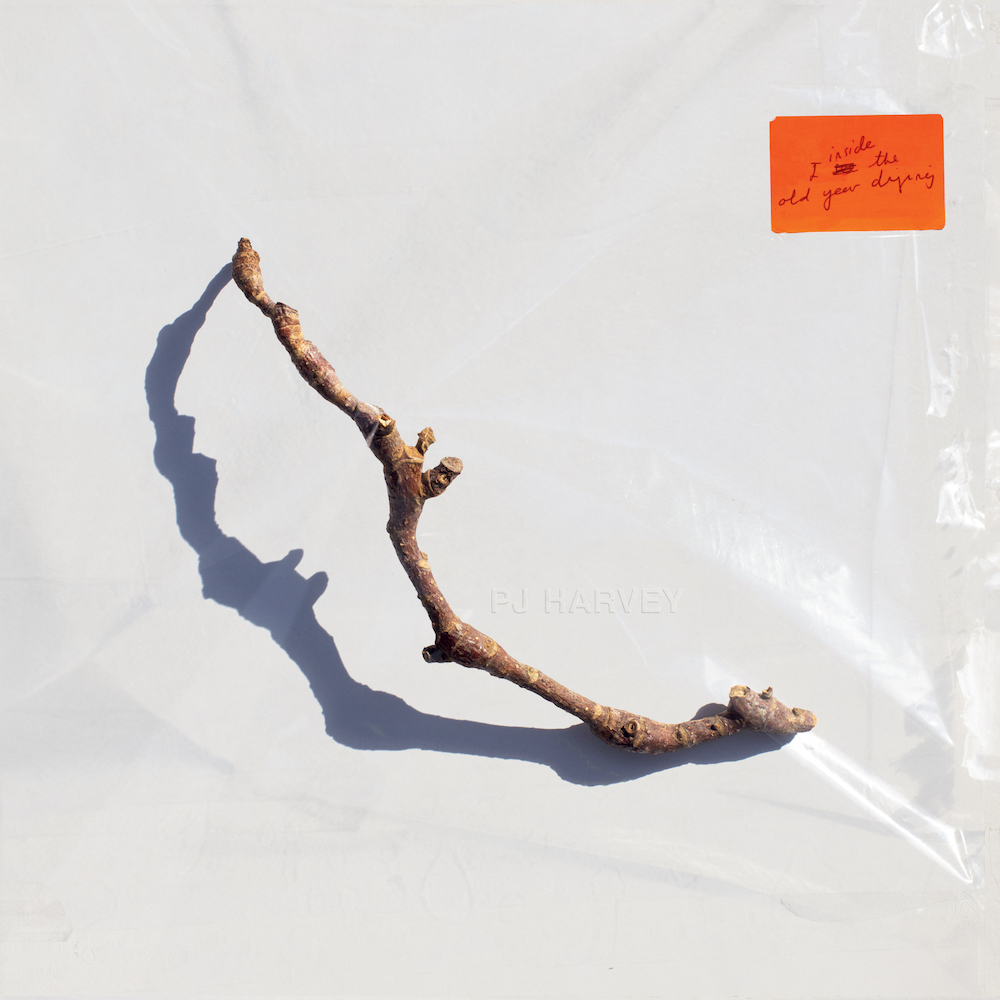
21.
PJ Harvey – I Inside The Old Year Dying
[Partisan]
Can we talk a moment to simply marvel at the discography of PJ Harvey? For a musician with such a notable, consistent image, Harvey has reinvented herself a remarkable number of times, always willing to explore new avenues of her famously expressive voice. Given the public recording and, one might say, slapdash nature of The Hope Six Demolition Project, my hot take would be to argue that Harvey’s last proper LP was 2011’s masterfully direct Let England Shake.
While it hasn’t received the attention of her past masterworks, I’d argue I Inside the Old Year Dying stands alongside the best of them. Despite linking up with longtime collaborators Flood and John Parish, the album stands in contrast to much of her work that seemed to unfurl naturally. Describing the process as “difficult” herself, recordings took years to be realized.
The struggle was worth it. Harvey’s voice often sounds weary across I Inside The Old Year Dying, tying together many threads that have frayed across her career. Derived from her epic poem, Orlam, the album smoothly pulls together Folk, electronic, and more into a prickly, fatigued experience. It’s as unsettling as it is intuitive, like wandering into some field in which you can’t escape a vague feeling of being unwelcome, yet so transfixed you dare not leave. It’s a cruel host, but I Inside the Old Year Dying tells us things we simply need to hear. – Chase McMullen
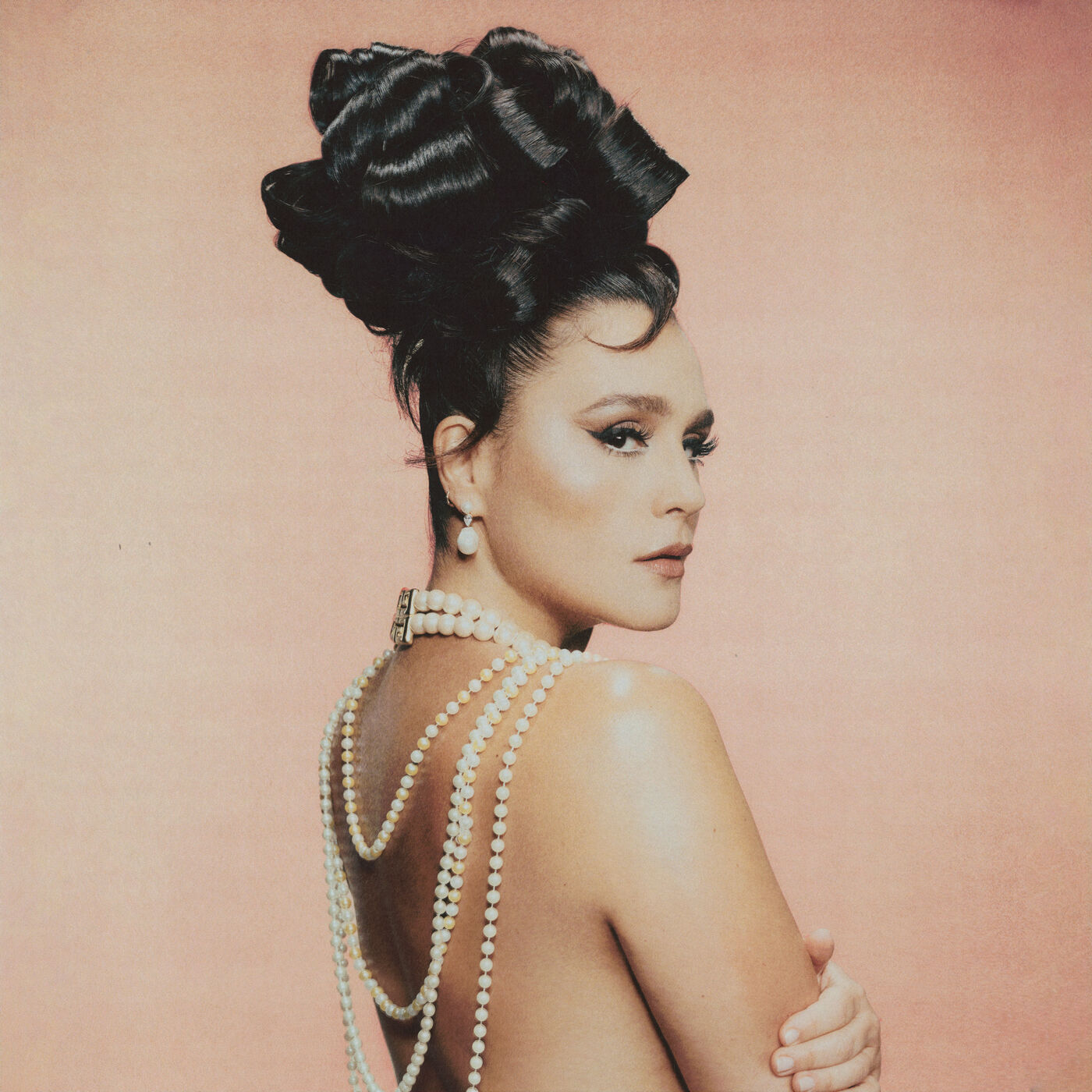
20.
Jessie Ware – That! Feels Good!
[EMI/Universal]
In November of this year, Jessie Ware played her biggest headline shows ever in The Great Hall at Alexandra Palace in North London. It was a homecoming, a victory lap, a culmination of everything she’d been working for. I was there, my esteemed Beats Per Minute colleague Rob was there; during the morning school run in Walthamstow the following Monday, it turned out that many other parents had been there too. Apparently, Jessie Ware, beyond having a devout LGBTQ+ following, is something of a hero amongst the parents-of-primary-school-age-children demographic. Incidentally, at the performances in question, her three young children were sitting just off stage watching their mother’s high concept, Cabaret-inspired disco-soul extravaganza. Ware’s status as a British national treasure should be assured by now; she’s an inspirational figure, a mother, a pop star, a… food podcaster.
Her reinvention from indie-soul adult contemporary chanteuse to glitter-ball illuminated disco queen that started with 2020’s What’s Your Pleasure? evolved even further on this year’s That! Feels Good! It’s a record that foregrounds the hedonistic ethos that “pleasure is a right”. It may be indebted heavily to the sounds of the past, but Jessie Ware and her songwriting partners and producers imbue every element of the record with care, attention, creativity and passion. Ware is here to give us a good time, because feeling good is… liberating. Had it not been released last year, “Free Yourself” would be high up on every list of Songs of 2023; it’s an indisputable disco-pop masterpiece. At the Alexandra Palace gig I attended it felt positively seismic, as if the palace itself was about to start dancing like the magical casita from Encanto. That felt good! – Andy Johnston
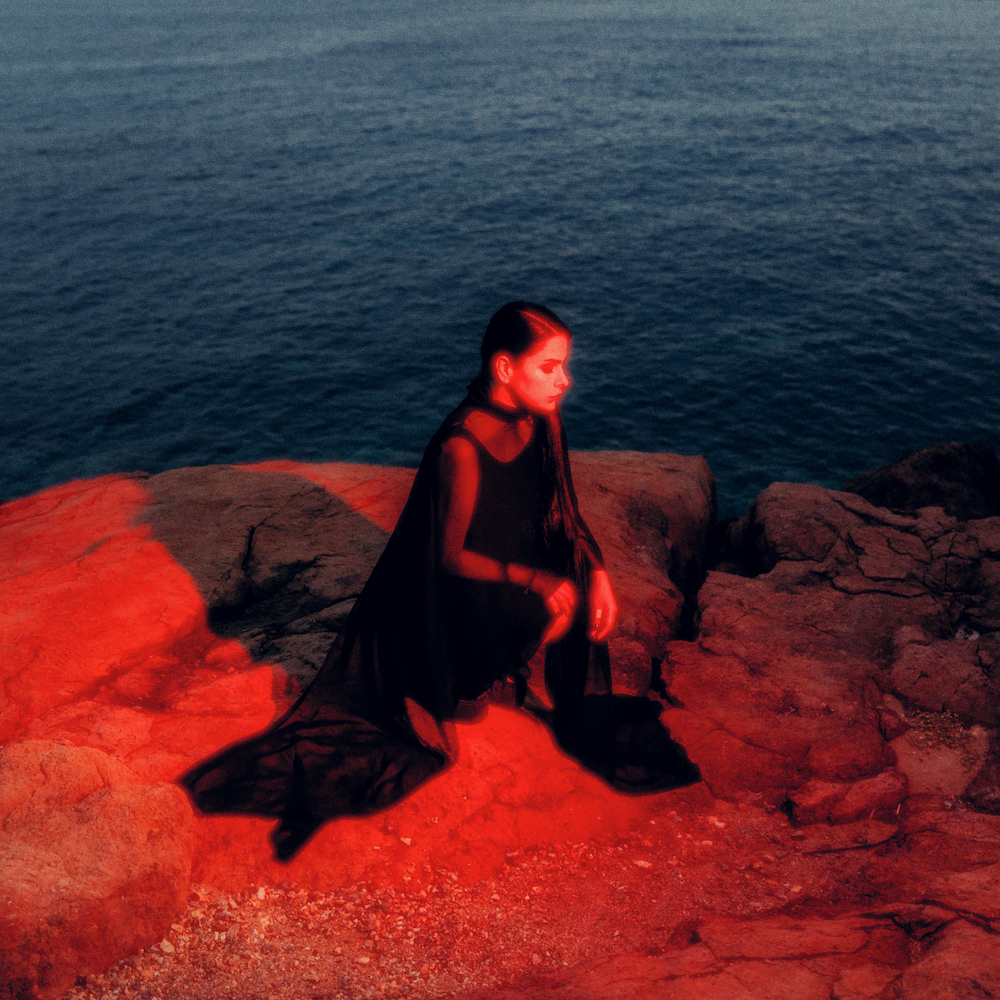
19.
Sofia Kourtesis – Madres
[Ninja Tune]
From the first swirling notes of Madres‘ opener and title track, electronic producer Sofia Kourtesis pulls listeners into a world of elation, wonder, and gratitude. It’s a world drawn from her Peruvian roots, her current home in Berlin, and all of her experiences in-between. Take album highlight “Estación Esperanza”, which features Kourtesis’s role model and collaborator Manu Chao. The track’s use of protest samples and ringing percussion, weaved together with warpy synths, feels equal parts timely and timeless.
The house track “Vajkoczy” is named after the neurosurgeon who helped extend her mother’s life after she was diagnosed with cancer. Lasers and fuzz decorate the song’s heartbeat-thick rhythm, while Kourtesis’s words offer glints of determination and resolve, but also fear. The story may have a happy ending, but that doesn’t stop Kortesis from embracing a kaleidoscope of emotions which, as a result, are felt in every beat of Madres. “Si Te Portas Bonito” is as seductive as it is danceable, while the chord shifts on “How Music Makes You Feel Better” are charged with ecstatic anticipation. Kourtesis understands more than most how connection can be felt just as strongly on the dance floor as through a pair of headphones halfway around the world. – Carlo Thomas
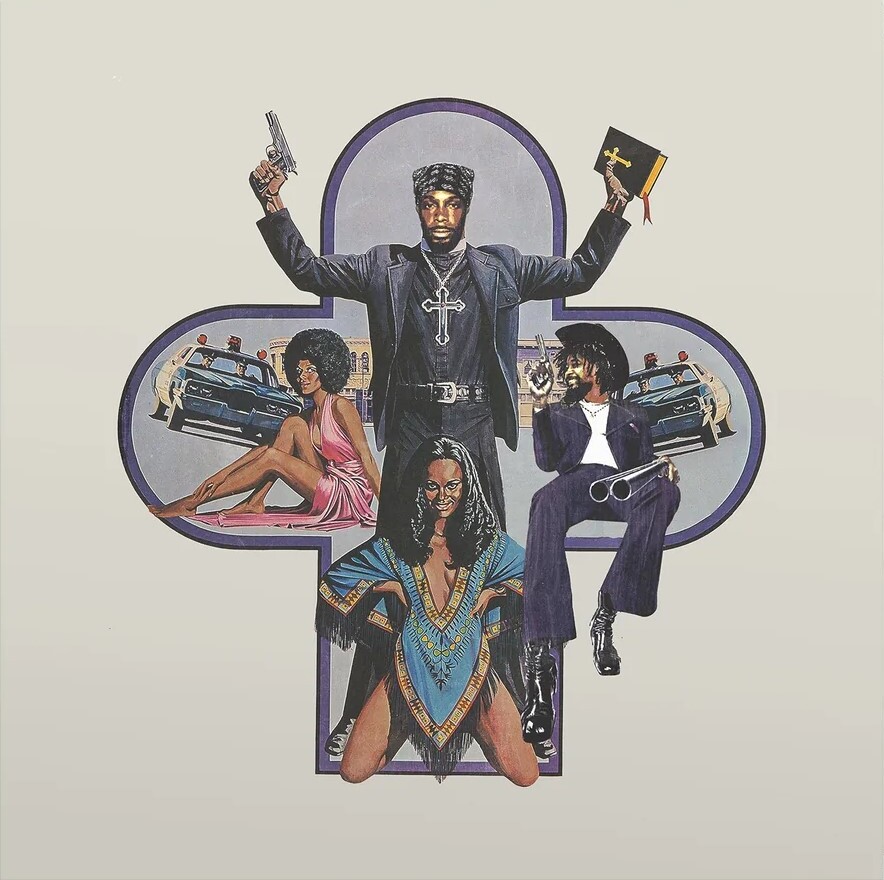
18.
JPEGMAFIA & Danny Brown – Scaring The Hoes
[PEGGY/AWAL]
First off: FUCK ELON MUSK! How the hell did we initially miss out on reviewing JPEGMAFIA and Danny Brown‘s behemoth? Sitting around the massive, platinum-coated and diamond encrusted war-room desk, the BPM staff pointed fingers at each other, emoting cries of “I thought YOU had signed up for THIS!!” Well, now we are here, with me having to sum up the sheer absurd punch of this behemoth. Let’s see…
Stitching together a patchwork of obscure references – from videogame franchises to female bodybuilders – Scaring the Hoes collides peggy’s caramel-voice and post-internet phantasmagoria (“For the hoes in the back and the crackers in they slacks / If I tweet then delete then I meant it”) with Danny’s freakish mugwump libido snarl (“I’m a stone cold degenerate, working out wit’ no membership / A minute late, you’ll wonder where the bitches went”). Accelerating in breakneck tempo, the record jumps between compositions and samples, somersaults and eats its own tail. The musical equivalent of kinetic sand videos fucking subway surfer speedruns, it extends itself across generational landmarks, somehow creating an etymological avant-garde tapestry of Black culture and its influences in the process. Sure, some of it is satirical, but throughout the machine-gun rattle of sped up samples, the feeling of pure joy and euphoria overwhelms any analytical intention.
It’s hard to find direct comparison to how Scaring the Hoes functions as a cultural artefact. Is this how it felt first bumping into The Velvet Underground or free jazz in some smoke-drenched bar? Burroughs in a NY toilet stall or Polybius in a small town mall? A direct product of Zoomers growing up with Death’s Dynamic Shroud’s modus of skipping through playlists that mesh Bill Charlap, Yoko Kanno and Ginuwine – all co-existing in the same temporal space of ‘the past’? Some call that crap, others industrial rap, but it is closer to the insanity of early Ol’ Dirty Bastard, aiming for music that expresses the ruthless souls that live fast, slashing canvases to transcend the fabric of time. Degenerate and perverse in gestalt, some people will argue that Scaring the Hoes is shallow, but as Danny raps, they’re jumping off the deep end! A milestone. – John Wohlmacher
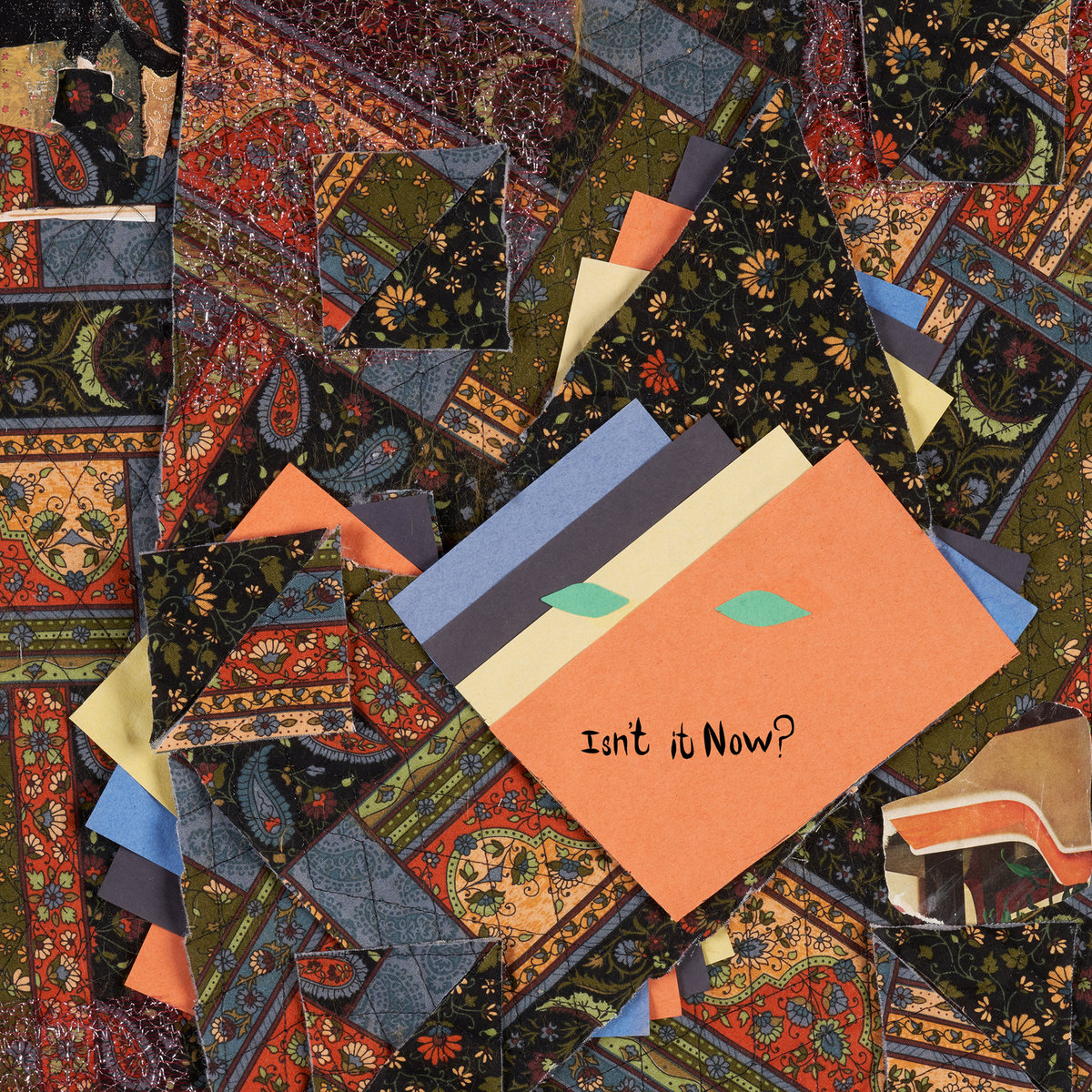
17.
Animal Collective – Isn’t It Now?
[Domino]
While last year’s Time Skiffs leaned more into Animal Collective’s psychedelic sensibilities, this year’s Isn’t It Now? serves as a deeper deconstruction into their appeal. It’s among their most demanding works, a slow-burner that trades out anthemic numbers like “Strung With Everything” for songs filled with quiet left turns (the 21 minute “Defeat”), swirling moments of bliss (“Broke Zodiac”), and tranquil yet irresistible harmonies (“Gem & I”). The album’s standout moments, such as the vaudevillian piano keys that accompany the climax of “Magicians From Baltimore,” are treated with both showmanship and restraint. The album remains as interesting as the group’s best precisely because the group understands the rewards that come from embracing a song’s natural evolution.
Isn’t It Now? also succeeds thanks to musicians who haven’t lost their childlike spirit and enthusiasm. The bouncy cadence that drives “All The Clubs Are Broken,” could soundtrack an afterschool special, while their chanting on closer “Kings Walk” wraps up the album with the playful defiance of kids playing make-believe in the woods, refusing to come home for dinner. Only Animal Collective could have concocted Isn’t It Now?—it’s a wonderful entry into a near quarter century-long discography, from a band whose best days may very well be ahead of them. – Carlo Thomas
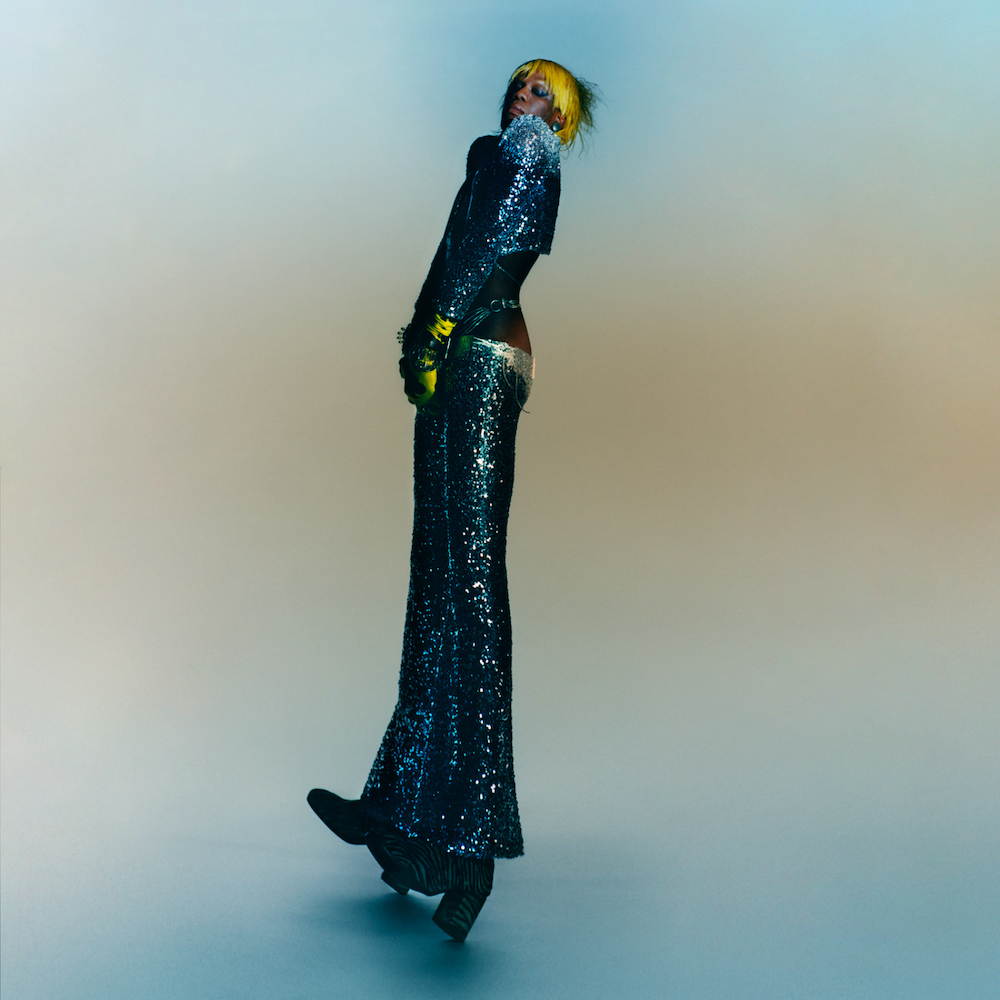
16.
Yves Tumor – Praise A Lord Who Chews But Which Does Not Consume; (Or Simply, Hot Between Worlds)
[Warp]
Yves Tumor’s Praise a Lord Who Chews But Which Does Not Consume; (Or Simply, Hot Between Worlds) is auditory nirvana with its corpulent heat of ecstatic proportions and layers of limpidly mixed sounds perfectly placed to make even distorted guitars sound like theta waves. The album’s metachrosis is never muddling, it just displays an artist who can morph from track to track flawlessly: they pack a decades-long catalog of tracks in 37 minutes. Praise a Lord is a genre-surfing masterpiece blend of pop-electronica-rock-metal-glam punk to name just a few. Yves has whipped up a little something for everyone and tickled a little curiosity about what is next for them. – Kristy Sawyer
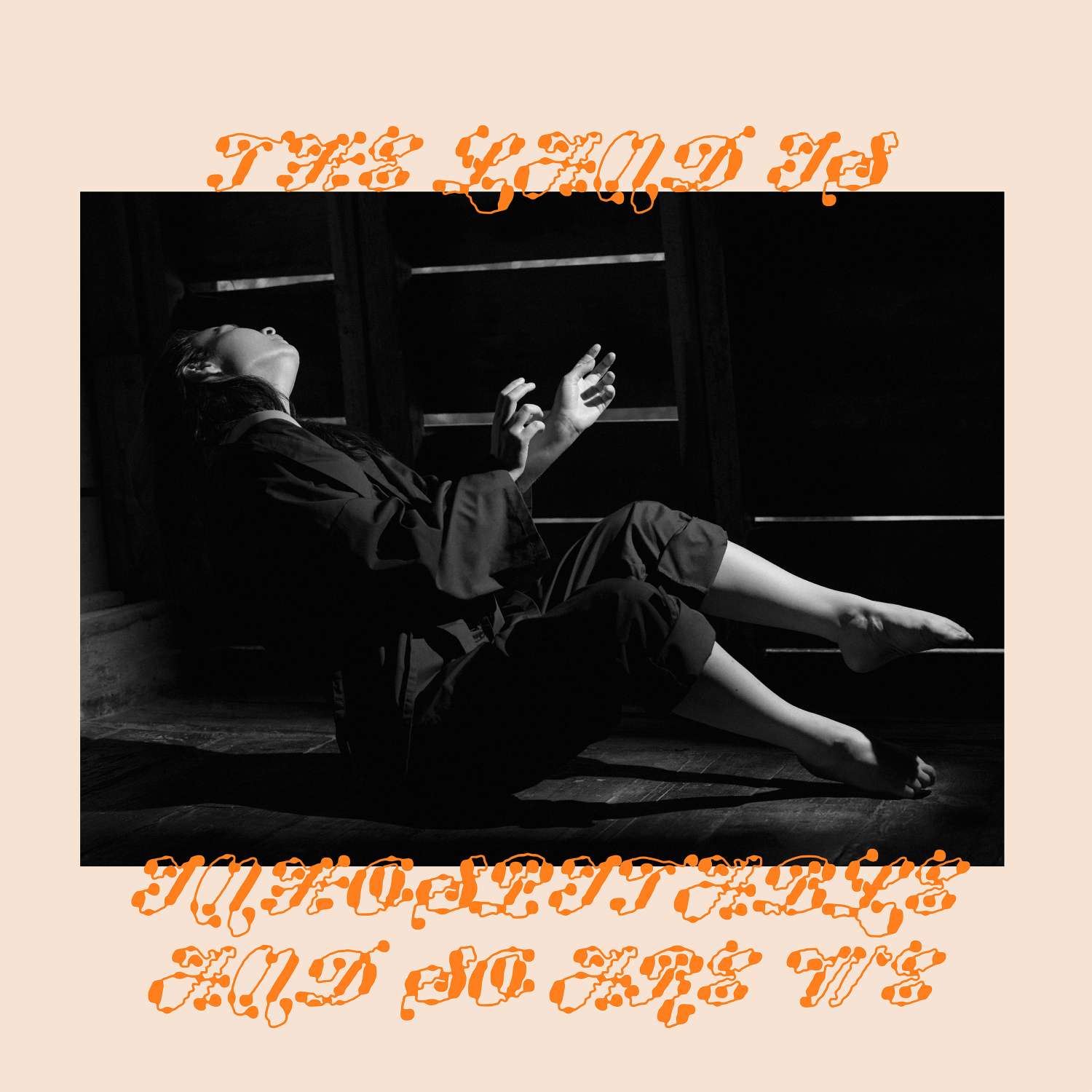
15.
Mitski – The Land Is Inhospitable And So Are We
[Dead Oceans]
Leave it to none other than Mitski to pull out all the stops arrangement-wise with resplendent country-noir grandiosity, yet still somehow surface with an album that resonates as a spare snapshot of day-to-day dallying and dreaming. The Land Is Inhospitable and So Are We finds Mitski in her biggest echo-chamber yet to allow her incisive songwriting instincts to breathe. Yet she still wraps it up with a bow in a cool, calm 32-minutes of runtime. Indeed, she had her whole cake and somehow ate it too.
There are no uptempo disco-pop torch songs in the vein of “Nobody” or “The Only Heartbreaker” on The Land; within the album’s more languid, slow-paced space, Mitski’s ability to never give in to cheap emotion – this in spite of her economical phrasing – strikes as more devastating than ever. No better example than the album’s opener “Bug Like An Angel”, which sits in an uncomfortable aftermath of melancholy and addiction: “When I’m bent over, wishin’ it was over / Makin’ all variety of vows I’ll never keep / I try to remember the wrath of the devil / Was also given him by God.”
The Land Is Inhospitable and So Are We feeds into the notion that we only truly become our most candid selves when we’re surrounded by silence and solitude. Mitski’s resourcefulness as a songwriter always keeps the listener at arm’s length, but The Land Is Hospitable and So Are We nevertheless feels as her most personal album yet. It sounds like the musical counterpart to Ottessa Moshfegh’s novel Death In Her Hands, a heart-wrenching account of life in the slower lanes. Not to mention fortifying Mitski’s status as the greatest songwriter of her generation. – Jasper Willems
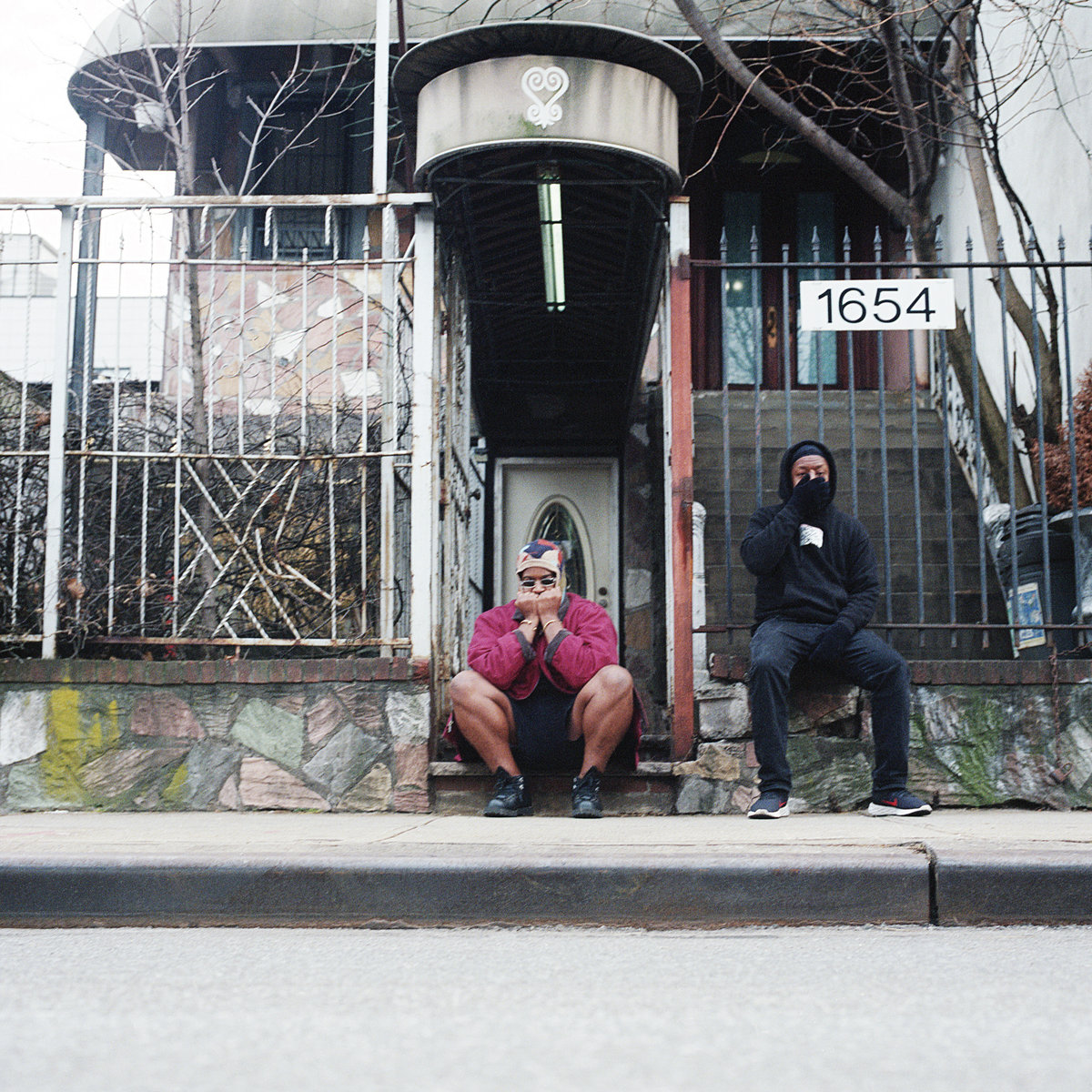
14.
Armand Hammer – We Buy Diabetic Test Strips
[Fat Possum]
At the centre of a nexus of crossed fibre optic cables, desperate payphone calls and ancient voicemails that will never be heard sit Armand Hammer, plugging the switchboard of the universe into their brains. The duo of billy woods and ELUCID have built up a reputation for intelligent, doom-mongering and cryptic storytelling across their discography both in unison and solo, but We Buy Diabetic Test Strips sees them build on their growing notoriety to create their most accomplished record to date.
Just look at the names involved to get an idea of how far Armand Hammer’s web now extends: producers including JPEGMAFIA, Preservation and El-P, guests including Pink Siifu, Curly Castro and Junglepussy – heck there’s even a group of We Buy Diabetic Test Strips “players” including Shabaka Hutchings on woodwinds. It’s an about-face from previous album Haram, which was entirely produced by The Alchemist, but the sheer strength and magnetism of the duo’s unique vision pulls it all together into a fearsome whole.
Across the album, Armand Hammer cut through the noise (quite literally in the case of these extremely unkempt productions) to deliver their interpretations of the world’s spiral. The partnership deliver sermons on society’s crises and the hypocrisy of trying to live happily through it all, ELUCID the apocalyptic preacher to woods’ underworld sufi.
While their dense verses are packed with ideas to pore over and unpack, they can be just as cutting in single quips – and We Buy Diabetic Test Strips is a veritable grab-bag of goodies. Whether it’s woods packing decades of narrative into one line (“my old friend still got a bum knee because the 03 Eagles didn’t cover”) or ELUCID unspooling personal truth among his ominous premonitions (“Put the computers to sleep and grab a rifle / They say I ain’t supposed to be here pre-zygote / So the bones hit different”), their storytelling is unrivalled – once decoded.
But even if the greater meaning sometimes remains elusive, the pair are masters at attuning the words to the production to add impact. Hutchings’ smokey woodwinds on “The Flexible Unreality of Time & Space” provides a perfect backing to woods’ law-based paranoia (“I put money in the wall / I put money in the floor / I put money in getting the door reinforced”) while the bubbling sounds of “When It Doesn’t Start With A Kiss” makes ELUCID’s invitation to “meet me in the float tank” seem more vivid.
At every turn, it seems like Armand Hammer are teasing and testing. They’ve woven everything they’ve learned into a finely detailed map of the truth that leads you in circles. They are the true relayers of the downfall of reality – or what might be perceived as reality – and, what’s more, we ain’t seen the bottom yet. – Rob Hakimian
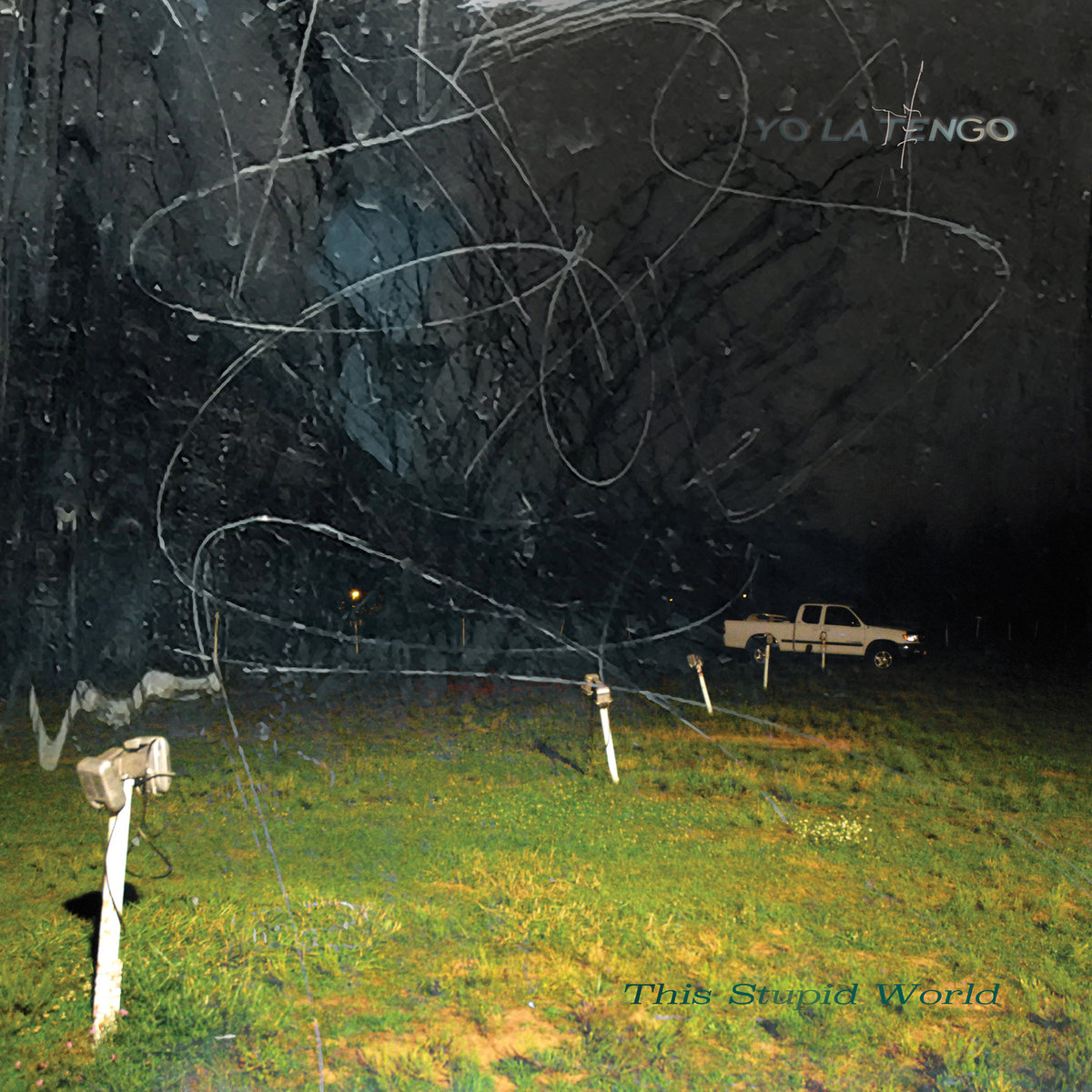
13.
Yo La Tengo – This Stupid World
[Matador]
Yo La Tengo have seen some shit. They’ve been together for almost 40 years and have shaped indie rock in ways still yet to be understood. Over the decades, they’ve explored rough-edged jangle-pop, stripped-down rock and roll, waves of distorted rhythms, mutated arrangements — basically every conceivable noise a guitar can make. And through it all, they’ve managed to remain restless, always ready to shift in their approach to the music, to shake out the designs of their past and reshape their future.
This Stupid World is their manifesto, a comment on all the years spent making music, making sense of the world, figuring out how every fits together. They’ve looked back at their history and found something worth celebrating, a lifetime of friendship and creative collaboration, and over these nine songs, they let us know that they still give a fuck.
“Sinatra Drive Breakdown” opens the album with a shot across the bow, a call to arms for those who’ve shared in their work for decades. Noisy and raucous, it sets our expectations for everything that follows, a reassessment and refinement of past impulses. It feels damaged, worn, and exudes a prickly personality, but it also displays an understanding of the malleability of rock music, an awareness of its warped contours. They ramble through “Aselestine” while going on to channel the deranged rock aesthetics of Can on “Brain Capers”. They’re content in their older selves, seeing time as both whetstone and revealer. There are going to be bad times and worse times and moments when the light is allowed through.
This Stupid World is Yo La Tengo’s acknowledgement of this inevitable cycle, an album filled with undiluted clarity of purpose and molded by the warm embrace of friends. – Joshua Pickard
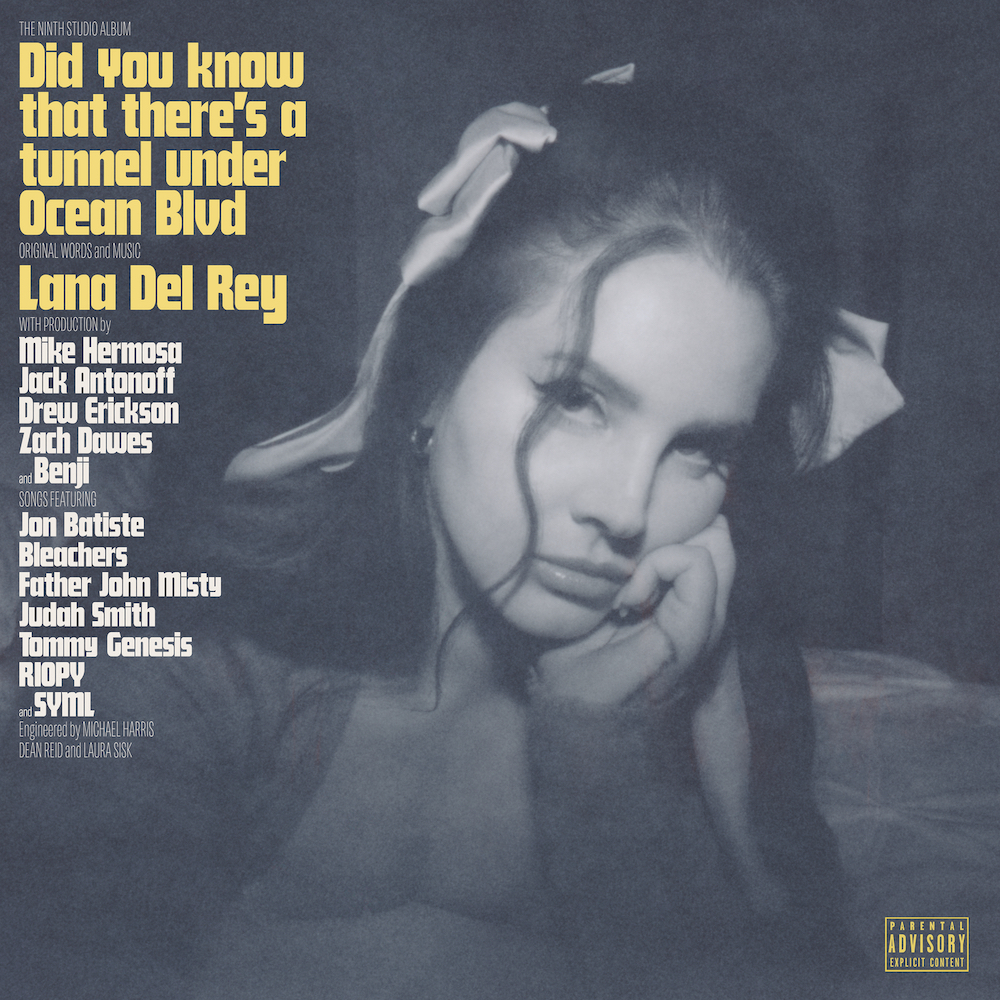
12.
Lana Del Rey – Did You Know That There’s A Tunnel Under Ocean Blvd
[Universal]
Lana Del Rey is one of the more prolific and earnest artists of the past decade, delving into her life and exhuming whatever she finds beneath her poetic eye. Such emotional discoveries are presented in her eighth studio album Did You Know That There’s A Tunnel Under Ocean Blvd which is, as its title suggests, a lengthy masterpiece filled with contemplations, ruminations, questions and grief that both thrills, soothes and perplexes.
Even by the Del Rey scale of transparency, this album proves incredibly personal with stream-of-consciousness glimpses into her raw mindset during a tumultuous time (“Fingertips”); the sly wink of inside jokes us listeners aren’t privy too as she contemplates the marriage of her friend and collaborator Jack Antonoff (“Margaret”); the languishing of being with someone who doesn’t want to see you conquer your demons (“Fishtail”); and the hedonistic, no-fucks-given fun of a sexually fulfilling relationship (“Peppers”). This album refuses to stay within one field of her vision and she happily indulges in her multiplicity.
While there are many highlights in this long project (clocking in at an hour and 17 minutes), there are two particular ones that convey the beauty and starkness of this project. The exultant opener “The Grants” is a devastatingly beautiful love letter to her family – particularly those who have passed away (“My pastor told me when you leave / All you take is your memory / And I’m gonna take mine of you with me”).
On the opposite side of the spectrum, the second highlight is the roughened and gritty epic “A&W” – one of her darkest and poignant tracks yet. In the sprawling track, Lana uses the flip side of sexual healing to explore questions of slut-shaming, misogyny and the fallibility of attempting to find meaningful love (“It’s not about having someone to love me anymore / No this is the experience of being an American whore.”) However, when you think these brutal ruminations might consume her, the second part of the song transforms into a punchy hip-hop esque track where she forces the men she’s been with to look in the mirror. “Your mom called / I told her you’re fucking up big time,” she gleefully says twisting their one-dimensional view of women into one of shame. This bleak track is the obsidian jewel in the crown of this album – one that establishes that Lana’s sharpness hasn’t been dulled by her more pastoral approaches to music.
Did You Know…? is further consolidation of Lana as an excellent writer and someone who does what she musically wants without adhering to the volatile nature of expectations. It is triumphant and soaring; plaintive and yearning; angry and discerning. Even when she wears her white dress, she has never been worried about running through the mud because that is, inevitably, what life throws at us. – JT Early

11.
Joanna Sternberg – I’ve Got Me
[Fat Possum]
“Between self-hatred and self-awareness / is a very small thin line”, Joanna Sternberg observes on the title track of their second LP, I’ve Got Me. The lyric points to a self-evaluative process that pervades the album, Sternberg offering sarcastic, self-incriminating, and humorous insights. Undergirded by straightforward folk and country accompaniments a la everyone from The Carter Family to Adrianne Lenker, I’ve Got Me’s commentaries land as emotionally charged yet restrained. Sternberg’s angst is subdued yet palpable.
Many of Sternberg’s inquiries center around the motives of other people, particularly friends or possible partners. “The Love I Give” reworks a vintage AM/gospel tune, Sternberg addressing their tendency to extend love to people who don’t reciprocate. The piece exudes a satirical tone yet hints at a cynicism that is cumulatively disturbing. On “I’ll Make You Mine”, Sternberg again explores this tendency, determined to win over someone who is clearly incapable of commitment.
With “She Dreams”, Sternberg outright grieves their experience of unrequited love. “Her eyes pierce my heart with a sword / … soft lips that kissed him goodnight”, they offer, drawing from Shakespeare as much as Shakespeare in Love. While Sternberg occurs as a fragile figure, I’ve Got Me also highlights a certain resilience or hardiness, even if the singer drifts toward a concerning disillusionment. Also, despite a semi-confessional style, a compelling elusiveness endures. Sternberg reveals much; however, they also practice an introvertive reticence. This sense of mystery calls a listener back again and again. – John Amen

10.
billy woods & Kenny Segal – Maps
[Backwoodz Studioz]
With Maps – his second full-length collaboration with Kenny Segal – billy woods portrays himself as a world traveler and time-jumper of sorts. Even so, he frequently confesses his own shortcomings, voicing an ever-growing awareness that success, as defined in the West, is a misnomer, celebrity an apparatus that does little more than bolster the ego.
Opener “Kenwood Speakers” spotlights woods as he describes his busyness (“the way I’m running should be kissing babies and glad-handing”), comparing himself to a campaigning politician. woods, however, has always approached a theme loosely and expansively. By the final verse, he’s describing a “dinner party with the neighbors”. With the final lines (“I whispered in the host’s ear all night / I hear they found him in the morning / hose run from the exhaust pipe”), he compares himself to Silence of the Lambs‘ Hannibal Lecter, who talked to the character Miggs for hours, the latter killing himself by dawn (Lecter’s action is, in turn, drawn from Milton’s image of Satan whispering into Eve’s ear prior to the Great Fall). Segal experiments with washed-out drums and a hammering bass part. As the song progresses, woozy synths give the track a vintage, street-noir vibe.
“Blue Smoke” is a similarly expansive rap, grounded in the lines “Johannesburg in a Ford Explorer / just remembered it’s the 4th of July”, though woods has no problem pivoting into semi-abstract collages. Segal’s soundscape brims with a nomadic bass, scratchy percussion, and lounge-y horns. On “Bad Dreams Are Only Dreams”, meanwhile, Segal revels in druggy swells and surreal dissolutions. woods commences with an allusion to “jet lag” but soon segues into phrases that point to his exhaustion as much as an unsatisfiable urge to over-achieve (“half-asleep with the halo dead on my feet”, “private dancers dance for me”).
With “Year Zero”, woods drawls a compressed take on evolution (“apes stood and walked into the future”), “police brutality”, and hopelessness (“I quit looking for solutions”). He again balances poetic leaps and tonal cogency, his signature delivery unifying his centrifugal lyrics. Danny Brown contributes a lurch-y guest-spot that contrasts aptly with woods’ more languid offering. Throughout the track, Segal moves effortlessly between glitchy and warped accents, occasionally resolving tensions by interjecting softer and/or sustained notes.
While Maps is perhaps inspired by the metaphor of travel, woods uses his tracks, per usual, to weave nonlinear narratives, present vernacular philosophies, confront his ghosts, and undertake epic exorcisms. Segal is an ideal partner, once again sculpting multifaceted sound-fields within which woods can unspool his magic. – John Amen
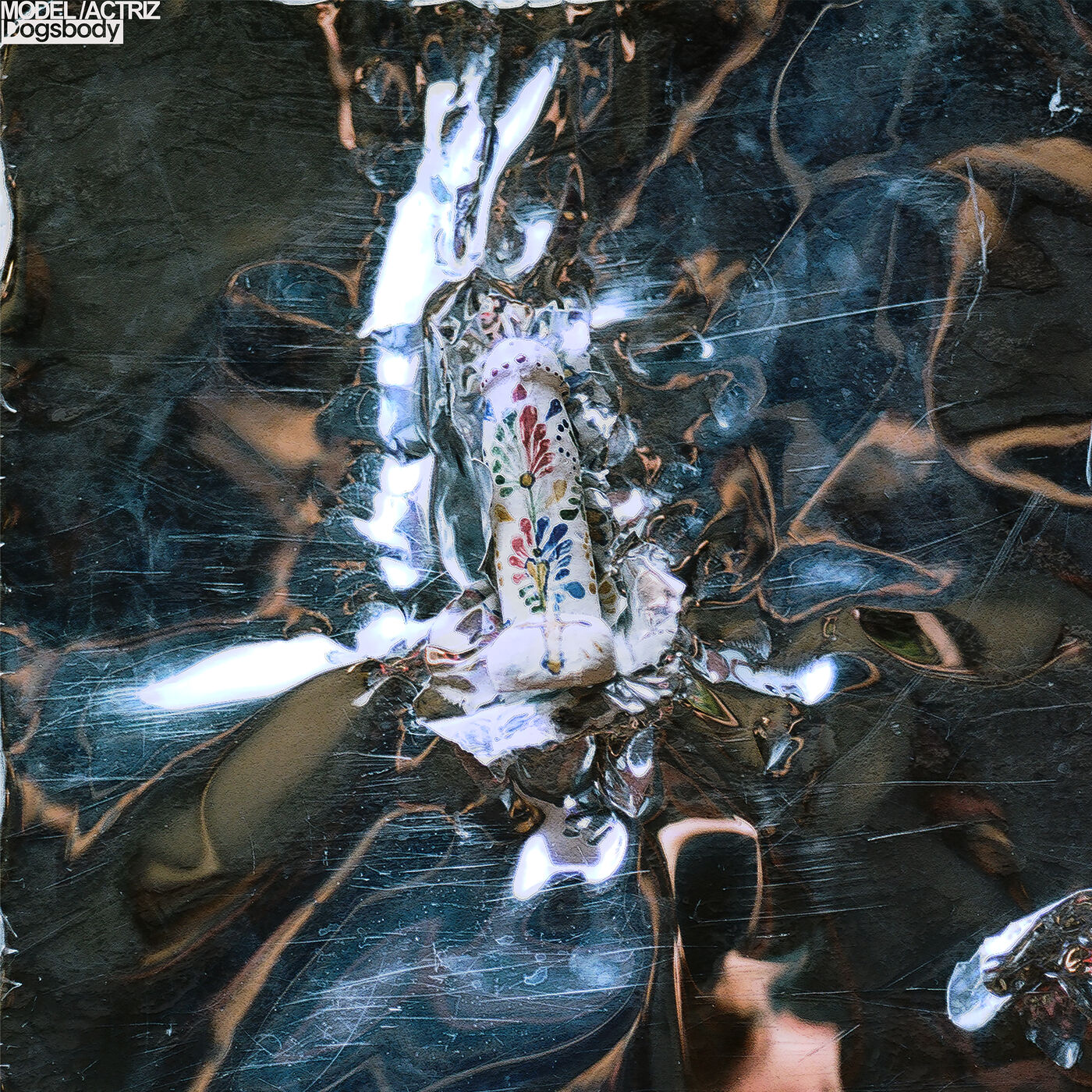
9.
Model/Actriz – Dogsbody
[True Panther]
To listen to Model/Actriz‘s Dogsbody is to wrestle with hedonism, self-destruction, and queerness. The New York-based band throws themselves into their brand of razor-sharp punk with the chiseled grooves of the Rapture and the theatrics of Black Midi. Their ring master, vocalist Cole Haden, bounces between unbridled lust and intense self-loathing with every breath. He wears his body count with pride on “Mosquito” and on “Amaranth” knowingly moves forward with a doomed relationship, bloody metaphors and all. Dogsbody is one of the most visceral albums you’ll hear all year, a simultaneous adrenaline rush and panic attack.
Importantly, Dogsbody never falls into parody, never feels over-the-top. Model/Actriz treat the space on their quieter songs like “Divers” and closer “Sun In”, both of which deal with self-worth in relation to a partner, with as much care as their thrashers (on the latter, somber guitar strums glisten like weak sun rays hitting your hungover eyes). Model/Actriz understand all too well that the queer experience is one of extremes, one where casting judgment is all too easy for someone on the outside looking in. But on Dogsbody, Model/Actriz offer up a judgment-free zone, letting listeners take their tales as warnings to be heeded as well as invitations to indulge in their seediest wishes. – Carlo Thomas

8.
boygenius – The Record
[Interscope]
Proof that sometimes, albeit all too rarely, an end product can exceed the sum of its constituent parts. boygenius‘ The Record is a collection of songs from the trio of Lucy Dacus, Phoebe Bridgers, and Julien Baker about unity, love (usually unrequited – poetically, the best kind), about shared experiences, vulnerability, and an almost preternatural kinship. The dominant theme of hurt that seeps through the lyrics is always realistic, never overly maudlin, and merely reinforces the logical end result of intimacy. From the quasi-ethereality of “True Blue”, to the relatively feral “$20”, to the surrealist vicissitudes of “We’re In Love”, The Record leaps from one genre template to another without falling into the trap of contrivance. This is, after all, all about being authentic.
“Cool About It” hits hard if you’ve ever been in that post-breakup rut that mixes hope with acceptance. Easily the peak of an album filled with ridiculous highs, the track sees each singer taking a verse one after the other. The narrative thread is picked up, but the music never resolves. It’s circular, spiralling downwards, attentive to the notion that heartbreak is a universal ailment. Put simply, The Record is a gift. – Todd Dedman
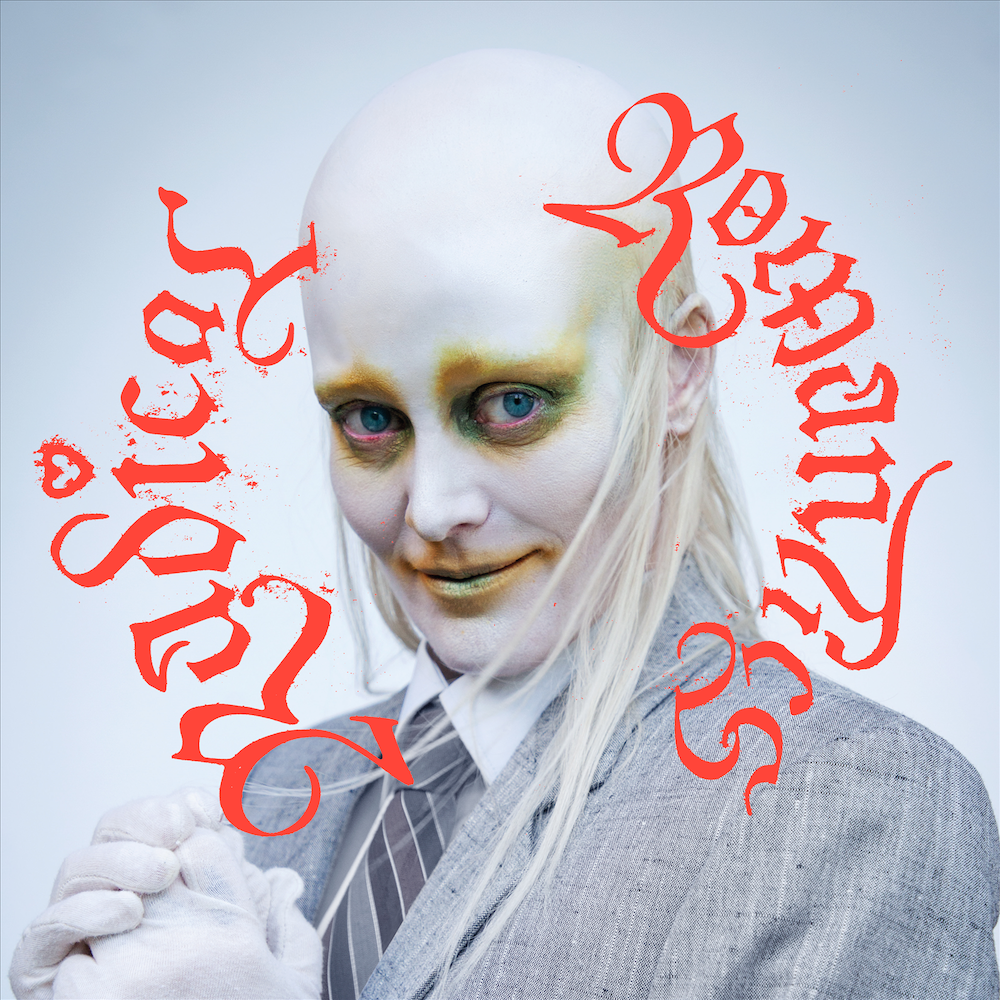
7.
Fever Ray – Radical Romantics
[Rabid]
With six years having passed since their last release, the anticipation for a new Fever Ray album was finally rewarded with the weird and wacky, yet strangely heartfelt Radical Romantics. Fever Ray – the moniker of Karin Dreijer – manages to delve into wonky, distorted spaces of electronica while providing some of their most personal lyrics yet. Even while ironically donning a costume vaguely hybridising a vacuum cleaner salesperson and someone in Davy Jones’ underwater coterie, Fever Ray manages to be more forthright and transparent than ever. Across 10 tracks hopping through sharp electronica, dark synth-rock and even a foray into ambient territory (closer “Bottom of the Ocean”), the album scratches the itch for interesting alternative pop.
Fever Ray tackles their subjects with bomb aplomb and always casts the human connection as a multi-faceted yet sharp double-edged sword. For example, the fast-tempo of “Tapping Fingers” hypnotically compares volatile intimacy to “building a nest of pins.” The anti-bullying anthem of their Trent Reznor and Atticus Ross collaboration “Even It Out” is ironically laden with a sense of threatening retribution. They even tackle identity politics and prejudice on the dynamically-produced, clattering “What They Call Us” where Fever Ray, assertive in a grim world, proclaims “Sometimes there’s this extra air / Sometimes I can keep my mouth open / I will stay if I dare.”
The vulnerable highlight of this album, however, is the queasily swooning “Kandy” built on spacious synths, sampled yelps and grimy notes that sound like a rag being wiped across a dirty windscreen. A subversive calypso track, “Kandy” finds Fever Ray’s voice in lovingly desperate modulation as they sing about reawakening themselves through the fulfilment of desire (“I trust you, no answers / Simply wood and fire”). However, this is not some sort of love song as Fever Ray underpins elements of existential dread (“What if I die with this song inside?”) and past traumas (“I’ve been alone forever”) even while discovering a potential new romance.
A masterpiece like “Kandy” summarises why Fever Ray’s album has made our list: their adept mixture of creepiness and catchiness, the dark production disguising their affirmative declarations and vice versa. Radical Romantics proves that you should never make assumptions about someone’s mindset based on their outside. For all the disconcerting disguises Fever Ray adopts, they have always had something authentic to say. – JT Early
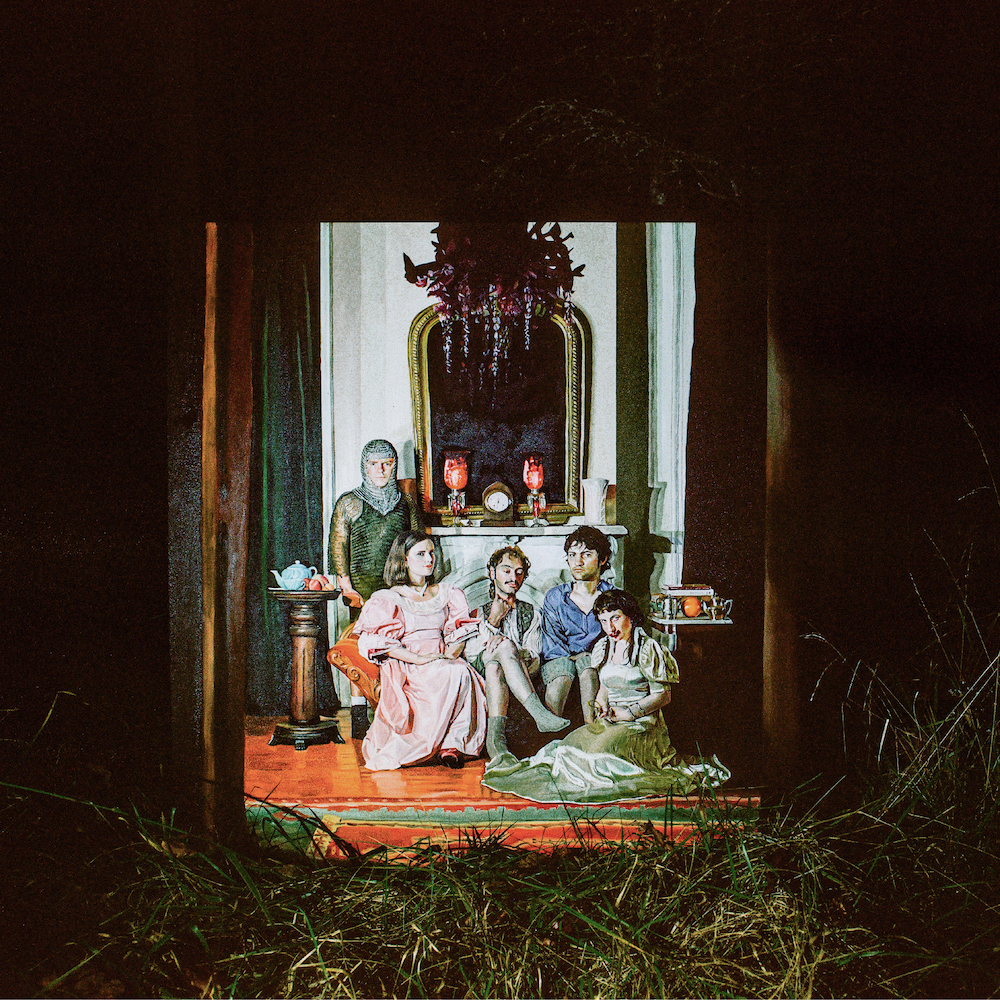
6.
Wednesday – Rat Saw God
[Dead Oceans]
Rat Saw God is a rare modern indie-rock LP firmly rooted by place. North Carolina quintet Wednesday’s fifth and finest LP offers a rollicking portrait of suburban decay – illuminated by details of “piss coloured” Fanta and listening to Drive-By Truckers. Against this backdrop are moments of stark confession and poetic revelations (“Nothing will ever be as vivid as the darkest time of my life”, confesses Karly Hartzman on “What’s So Funny?”). It’s a brilliant collage of memory and coming-of-age, sometimes ugly, sometimes beautiful, and often both at once.
But Rat Saw God wouldn’t be the indie-touchstone it already is if not for it’s evocative sound – a wall of fuzzy, 90s-esque indie rock penetrated by shades of Southern rock and Americana. Lead vocalist Hartzman, like Liz Phair before her, has a classic deadpan drawl that makes the otherwise mundane fascinating – be it birds flying into windows, or having sex in the back of a SUV. The rest of the band – which includes guitarist and acclaimed soloist in his own right, MJ Lenderman – prove remarkably versatile, capable of delivering a knockout punch with the heavy and imposing epic “Bull Believer”, and a pleasingly melodic back home romp with “Chosen To Deserve”. Rat Saw God leaves no doubt – this is a band who can do it all. – Tom Williams
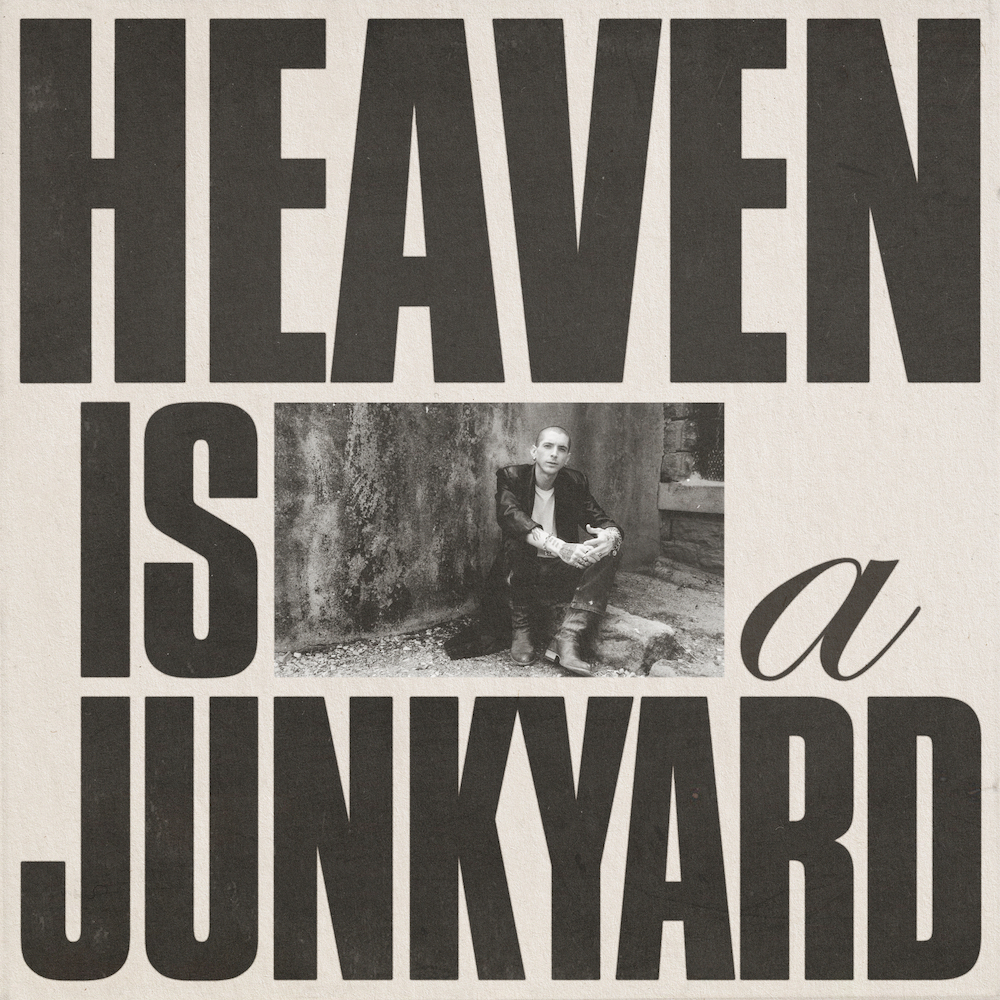
5.
Youth Lagoon – Heaven Is A Junkyard
[Fat Possum]
In the interim between releasing a couple albums under his given name and returning to his original Youth Lagoon moniker, Idaho songwriter Trevor Powers nearly lost his voice completely. Due to a freak medical incident that impacted his throat and esophagus, Powers was unable to fully speak — let alone sing — for many months. Thankfully, the symptoms of his health scare started to allay, and he decided that it was the right time to go back to the alias that put him on the map.
With a renewed focus and a gently pulsing drive, the fourth Youth Lagoon record, Heaven is a Junkyard, is Powers’s most remarkable effort yet. Tightly constructed and warmly produced, Heaven is full of stories of familiar discontent, drug abuse, emotional crises, and more less-than-pleasant subjects. Funneling the world around him into these trembling tunes, Powers communicates a wealth of emotion with the most minute details.
Fortunately, Powers’s voice — renewed and less cloaked in effects than ever, but still retaining its brittle, fragile beauty — is emotive and inviting enough to draw us in anyway. It helps that the album also contains some of his hookiest songs ever, like the glowing “Prizefighter” or the dramatic sweep of “Mercury”.
We are so fortunate that Powers recovered from his illness and came back stronger than ever, because the year in music is better with his warped, modern Edward Hopper yarns. – Jeremy J. Fisette
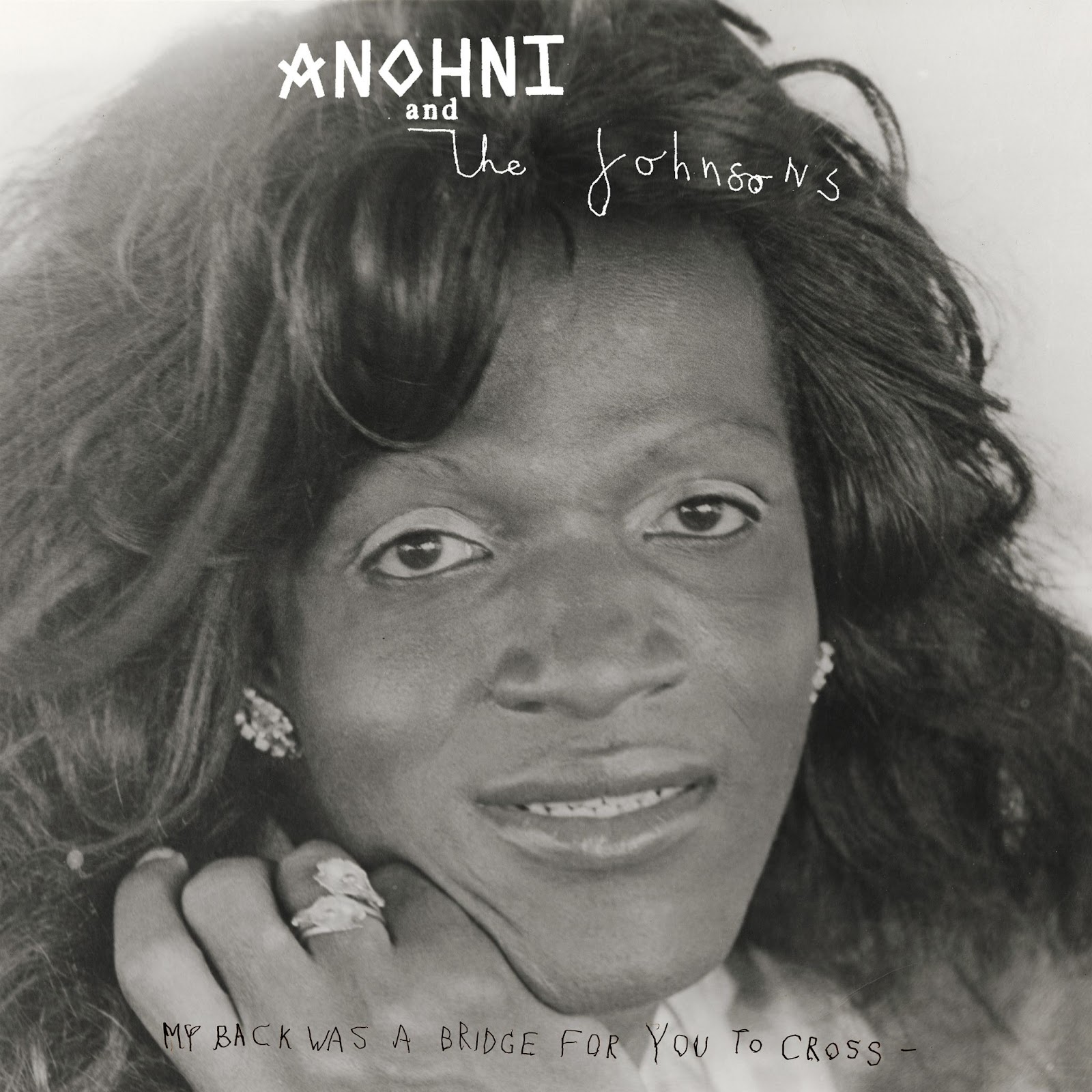
4.
ANOHNI and the Johnsons – My Back Was A Bridge For You To Cross
[Rough Trade]
The sheer sensuality and emotional gravitas of My Back Was a Bridge for You to Cross is like nothing else in ANOHNI‘s catalogue. Where in the past some of her projects could feel sentimental or self-congratulatory in their reflection on misery, here her voice soars above unbound rock and jazz backdrops, resembling the very best work of friend and collaborator Lou Reed – weightless and heavy as lead simultaneously.
Embodied by its centrepiece – the painfully tender and explosive “Scapegoat” – My Back… confronts its audience unfiltered, drawing tears and blood alike. Within those longing words of salvation from worldly suffering live the words and experiences of queer and trans artists who found themselves reflected in the pitiless gaze of uncaring societies.
Inspired by Marsha P. Johnson, whom the singer met mere days before her death, the record evolves into a reflection on the absurd beauty and cruelty within our brief stay on this world, untangling lifetimes through their coda. “Sliver of Ice” reflects on a conversation with Reed weeks before his passing, as the musician realised how the “simplest sensations had begun to feel almost rapturous”. The fiery, pummeling “Go Ahead” confronts self-destructive cycles, while “Can’t” is a thoroughly defiant rejection on their consequences and “Why Am I Alive Now?” extends the scale of suffering to global, apocalyptic proportions.
But none of it feels gratuitous or artificially enriched. It’s the sound of the deep sadness within the human experience itself, caught in perfectly incidental takes. It’s ANOHNI’s masterpiece, poetic in its quiet solace that, unlike the people it mourns – in the now and aeons to come – , it will never age and wither. – John Wohlmacher

3.
Caroline Polachek – Desire, I Want To Turn Into You
[Perpetual Novice]
When synth pop duo Chairlift called it quits after their third album Moth, it was a little unclear what would come of Caroline Polachek and Patrick Wimberly. But then a few years later, Polachek returned to music with her solo debut, the infectious and weird Pang. It didn’t sound totally divorced from what she had done with Wimberly for about a decade, but it saw Polachek digging into her stranger impulses, embracing bigger pop styles and hooks, and crystalizing her vision.
Now, with her sophomore record Desire, I Want to Turn Into You, Polachek is back and weirder and more infectious than ever. Taking everything that made Pang such a cool project and magnifying it by 10, Desire takes wild swings, skips down unpredictable detours, and sticks the landing with aplomb. We get bratty, punkish pop on “Welcome to My Island”. We get a psych rock-adjacent song on “Butterfly Net”. We even get a trip hop, jungle-esque posse cut with “Fly to You” featuring Grimes and Dido. Nearly every song veers into a new or alien direction, and somehow — perhaps through the sheer gravity of her artistic clarity and the strength of her gorgeous, glassy, and impossibly nimble voice — Polachek pulls it all together.
Through a cavalcade of intricate production, bubbling synths, slippery bass, swaggering beats, Spanish guitars, and yes even a bagpipe solo, Polachek has crafted a true mammoth of unclassifiable art pop, full of huge feelings and impressive performances. The work she made with Chairlift was always hinting at something even bigger, weirder, and brighter, and here, it feels like she has fully arrived. – Jeremy J. Fisette
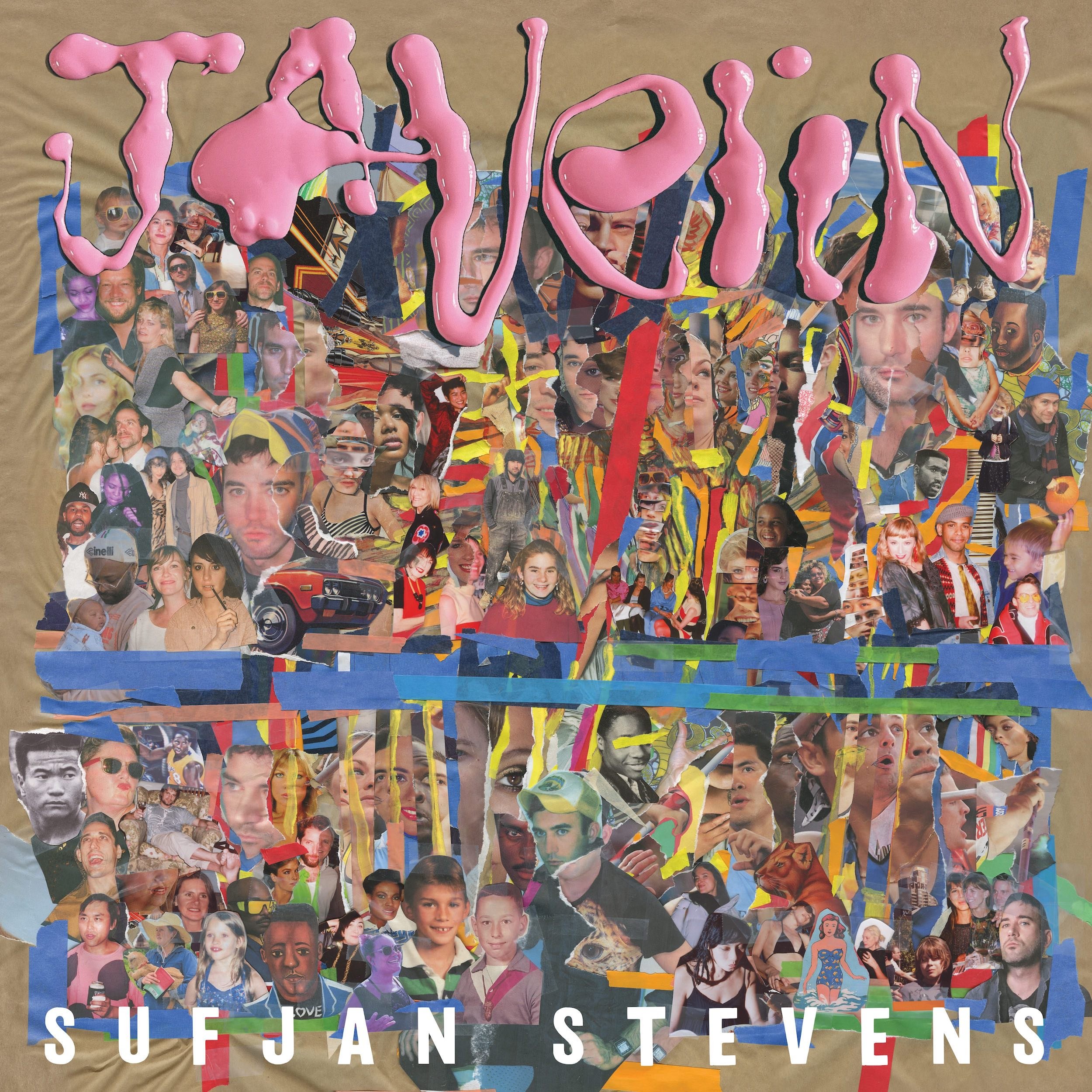
2.
Sufjan Stevens – Javelin
[Asthmatic Kitty]
In the wake of a year defined by personal tragedies— losing my brother and then my father just months ago — I’ve been navigating a landscape of suppressed emotions, yearning for some release — to cry. As it has for countless others for years now, Sufjan Stevens‘ music has become an emotional refuge — a conduit for tears refusing to flow. His intimate understanding of loss has always resonated deeply, making him a steadfast companion and solace through grief for anyone. Javelin, his latest masterpiece — and it cannot be expressed enough how much of a masterpiece it truly is — has become a poignant soundtrack to my own emotional turmoil.
In struggling to release pent-up sorrow, Stevens’ unparalleled ability to find beauty in tragedy is a guiding light. I’m sure Sufjan would rather be adored and confided in for reasons that don’t necessitate his pain and suffering, but it’s almost as if he was placed on this Earth to speak truth into the lives of those who look to him for advice. He doesn’t have all the answers, but he certainly has a voice and the momentary words to bond kindred souls to his. It’s a beautiful burden, and Javelin is yet another reason to be thankful for this individual’s heart, despite how often it is broken. The album’s emotional resonance is achingly palpable, weaving through images most intimate, pure and simple, all of which grief craves amidst calamity.
From the haunting echoes of a choir to the hushed vulnerability in his voice, Javelin attests to Sufjan’s profound connection to heartache. As I grapple with my own pain, the revelation of Sufjan’s battles adds a layer of devastation that’s almost startling. Every hush of his voice and each soaring orchestral release from a choir inspires like angels from the same heaven he grasps for. Not since Carrie & Lowell has Sufjan breathed more heart into his work. Javelin is devastating but also lifts spirits — if Sufjan can find beauty in tragedy incessantly coinciding with his existence, we can too. – Kyle Kohner

1.
Kelela – Raven
[Warp]
Kelela had been gone for so long. After a landmark debut album that consolidated all the excellent work she’d released in the years prior, we had radio silence from her for over five years. And then suddenly “A BITCH IS BACK,” she announced on socials in the tail end of 2022. “please TRUST the bangers are on the way. but first: how’s your heart?”
With this re-emergence came “Washed Away”, the ethereal lead single that now stands as the opener to the colossal Raven. It was all the fans needed to hear. Our hearts started beating louder, waiting for the deluge to come.
And what Raven turned out to be was so much more than just another album. It’s a full emotional and sexual excavation draped across 62 minutes of pristine future R’n’B and dance production.
“Washed Away”, with its sounds of waves crashing on the shore and Kelela’s chanting “far away”, welcomes us to Raven; an island nightclub outside of time where there are opportunities to escape from reality – but just as many to delve deep into the stress and pain of romance too, to try and untie the knots stuck in the psyche.
But to start with, Kelela is here to party. As the sumptuous breakbeat kicks things off in “Happy Ending” we see her fully in her zone, grooving and flirting, slipping in and out of the shadows, teasing us on. The deftness and class with which she rides the production immediately re-establishes her as a luminary in this field. Misty synths and resonant bass on the following “Let It Go” provide atmosphere to her sighs; a spectral vision of a bad situation she’s just left.
This push-and-pull of desire, emotion and energy persists through the first half of Raven and culminates in “Contact” – the peak hour banger done Kelela style. The high point of the night, over an irresistible techno-light beat she celebrates “2am and we made it / everybody faded”, the kinetic movement of bodies under lights vivid in the production.
But this is where Raven crumbles: Kelela can’t outrun the pain any longer. The dark side of 2am is upon us. She takes the mood down for a second half that is slow and engrossing. “Fooley” is the gradual unlocking of her soul before “Holier” has her admit “Thought I was good, but I’m not / And though it troubles my heart / Don’t want to cover the scar.” In this cracking open she starts the rise again into “Raven”; her rebirth. “Closer to what I need tonight,” she purrs in gentle satisfaction; “I can feel my body again.”
With that, the beat returns as we step into “Bruises”, Kelela commanding, repeating “find another way”. We hear her rebuilding her strength alongside the demanding rhythm before letting herself crumble into the arms of another in “Sorbet” – the perfect indulgence, a delight so profound that she admits “don’t know where we are boy”.
As the sun rises on Raven and the overwhelming pleasure recedes with the darkness, Kelela confidently sees out the album with newfound inner strength. She resolves to find a love that is worthy of all she is. By the time she sets sail back home on “Far Away”, we see a woman who has cleansed herself, physically and emotionally – and we’ve been through it all with her. – Rob Hakimian
Listen to a Spotify playlist of our highlights from our Top 50 Albums of 2023 here.
Check out our Top 50 Songs of 2023 here.

